You are using an out of date browser. It may not display this or other websites correctly.
You should upgrade or use an alternative browser.
You should upgrade or use an alternative browser.
GOV/MIL Main "Great Reset" Thread
- Thread starter marsh
- Start date
marsh
On TB every waking moment

Fatih Birol: We shouldn't have to choose between a climate and an energy crisis
This morning we brought together leaders from the energy sector as governments and businesses respond to the current crisis and efforts to reduce dependence on Russian energy.
Fatih Birol: We shouldn't have to choose between a climate and an energy crisis
This morning we brought together leaders from the energy sector as governments and businesses respond to the current crisis and efforts to reduce dependence on Russian energy.
Fatih Birol, Executive Director of the International Energy Agency, told the session that we're experiencing a truly global energy crisis for the first time. All the energy commodities are spiking in price, he said.
He's concerned that countries are reacting by overinvesting in fossil fuels, although he did acknowledge that we can't get through the current crisis without them. We should use our current capacity, giving us time to accelerate the energy transition.
1:02 min
He also stressed that as a global community, we shouldn't have to choose between a climate and an energy crisis.
.58 min
marsh
On TB every waking moment
Here's Klaus' full speech:
View: https://www.youtube.com/watch?v=jTfW-cchpYA
25:26 min
Welcoming Remarks and Special Address | Davos | #WEF22
(Focus in 4 areas: (1) The War in Ukraine; (2) Resilience against new virus and other health threats; (3) Climate change and the preservation of nature; and (4) Future economy - inflation, low growth, debts. The falling back of people into poverty and tens of millions of people dying of hunger.
Schwab: How can Davos contribute: (1) collaboration; (2) providing a political, economic/social & ecological holistic view; (3) optimism - joyful and grateful - future built by us by a powerful community as you here in this room. We have the means to improve the states of the world. But 2 conditions are necessary: The first one is that we act all as stakeholders of larger communities. That we serve not only self interests, but we serve the community. That's what we call "stakeholder responsibility."
President of the Swiss Confederation and Federal Councillor for Foreign Affairs of the Federal Department of Foreign Affairs, Ignazio Cassis.
Davos - being withdrawn from every day life doesn't mean we are withdrawn from reality. We hope to come away with fresh solutions. He talks about the "order" established after the cold war - open world markets technological progress generated prosperity, increasing democracy, freedom and stability. States, the economy and the public liked to believe that things would carry on as they are. Vulnerabilities to nationalism, hunger for power and protectionism. One crisis collides with the next: the financial crisis, climate change, the pandemic and Ukraine.
The War is a total disregard of what the community of states has achieved in civilization and progress. Switzerland came out in opposition to the Russian invasion and in favor of the EU sanctions. People ask why would Switzerland go against its long standing position of neutrality. Democracy must be stronger than tyranny; international law stronger than submission; law stronger than power; and self-determination stronger than oppression .....Uganda meeting to kick off the recovery of Ukraine.
War is synonymous with instability. The geopolitical security is being shattered and other principles of civilization as well. Against this background, there are many questions. There is a risk of increased polarization, but what does it mean for our global markets? What does it mean for economies and our prosperity?
Three Scenarios to serve as a starting point for discussion: (1) Highest risk - Sectoral globalization -the forming of blocks lead to separate economic areas and closed regional networks. Leads to polarization, hegemonic politics, cold wars over trade, a weakening global regulatory system. The blocking of trade leads to serious threats to prosperity. (2) Weighted retreat from hyper globalization. It comes with strategic calculation for nationalizing resources, value chains and production process of systemic importance. This will lead to reduced inter-dependence, less risk and fewer suppliers. The trade-off is higher product prices, since this targeted refocusing inevitably brings efficiency losses. This second scenario could possible present a transitional solution. (3) The third scenario is one of stronger targeted multilateralism and this is the way forward as far as he is concerned. Stronger targeted multilateralism and a renewed focus on the core tasks is the way to get past the dashed hopes. Multilateralism must focus on those major issues that cannot be dealt with in isolation. Issues such a: planet; pandemics; or extreme poverty. Issues such as global financial crisis; trade blockages; or energy supply. We are seeing this today, such as the risk of war, mass migration.
So lets think decisively about focusing rules and institutions on the most pressing geopolitical risks. The existing multilateral institutions, such as the UN and Bretton Woods institutions do cover these issues. But they are repeatedly blocked by conflicting interests. That tendency is increasing and because timely and decisive multilateral action in these areas, rules and reforms are needed to ensure widely accepted and binding political coordination that is up to meeting these new challenges. Three scenarios - one broad framework.
Perhaps your discussions will take you in other directions. That doesn't matter. What matters is that such discussions take place without moralizing and staying open to a broad range of opinions. Conversations are the basis for any new solutions.)
)
25:26 min
Welcoming Remarks and Special Address | Davos | #WEF22
(Focus in 4 areas: (1) The War in Ukraine; (2) Resilience against new virus and other health threats; (3) Climate change and the preservation of nature; and (4) Future economy - inflation, low growth, debts. The falling back of people into poverty and tens of millions of people dying of hunger.
Schwab: How can Davos contribute: (1) collaboration; (2) providing a political, economic/social & ecological holistic view; (3) optimism - joyful and grateful - future built by us by a powerful community as you here in this room. We have the means to improve the states of the world. But 2 conditions are necessary: The first one is that we act all as stakeholders of larger communities. That we serve not only self interests, but we serve the community. That's what we call "stakeholder responsibility."
President of the Swiss Confederation and Federal Councillor for Foreign Affairs of the Federal Department of Foreign Affairs, Ignazio Cassis.
Davos - being withdrawn from every day life doesn't mean we are withdrawn from reality. We hope to come away with fresh solutions. He talks about the "order" established after the cold war - open world markets technological progress generated prosperity, increasing democracy, freedom and stability. States, the economy and the public liked to believe that things would carry on as they are. Vulnerabilities to nationalism, hunger for power and protectionism. One crisis collides with the next: the financial crisis, climate change, the pandemic and Ukraine.
The War is a total disregard of what the community of states has achieved in civilization and progress. Switzerland came out in opposition to the Russian invasion and in favor of the EU sanctions. People ask why would Switzerland go against its long standing position of neutrality. Democracy must be stronger than tyranny; international law stronger than submission; law stronger than power; and self-determination stronger than oppression .....Uganda meeting to kick off the recovery of Ukraine.
War is synonymous with instability. The geopolitical security is being shattered and other principles of civilization as well. Against this background, there are many questions. There is a risk of increased polarization, but what does it mean for our global markets? What does it mean for economies and our prosperity?
Three Scenarios to serve as a starting point for discussion: (1) Highest risk - Sectoral globalization -the forming of blocks lead to separate economic areas and closed regional networks. Leads to polarization, hegemonic politics, cold wars over trade, a weakening global regulatory system. The blocking of trade leads to serious threats to prosperity. (2) Weighted retreat from hyper globalization. It comes with strategic calculation for nationalizing resources, value chains and production process of systemic importance. This will lead to reduced inter-dependence, less risk and fewer suppliers. The trade-off is higher product prices, since this targeted refocusing inevitably brings efficiency losses. This second scenario could possible present a transitional solution. (3) The third scenario is one of stronger targeted multilateralism and this is the way forward as far as he is concerned. Stronger targeted multilateralism and a renewed focus on the core tasks is the way to get past the dashed hopes. Multilateralism must focus on those major issues that cannot be dealt with in isolation. Issues such a: planet; pandemics; or extreme poverty. Issues such as global financial crisis; trade blockages; or energy supply. We are seeing this today, such as the risk of war, mass migration.
So lets think decisively about focusing rules and institutions on the most pressing geopolitical risks. The existing multilateral institutions, such as the UN and Bretton Woods institutions do cover these issues. But they are repeatedly blocked by conflicting interests. That tendency is increasing and because timely and decisive multilateral action in these areas, rules and reforms are needed to ensure widely accepted and binding political coordination that is up to meeting these new challenges. Three scenarios - one broad framework.
Perhaps your discussions will take you in other directions. That doesn't matter. What matters is that such discussions take place without moralizing and staying open to a broad range of opinions. Conversations are the basis for any new solutions.)
)
Last edited:
marsh
On TB every waking moment
Regarding the War in Ukraine, I found this section from Steve Cortes today to be very telling:
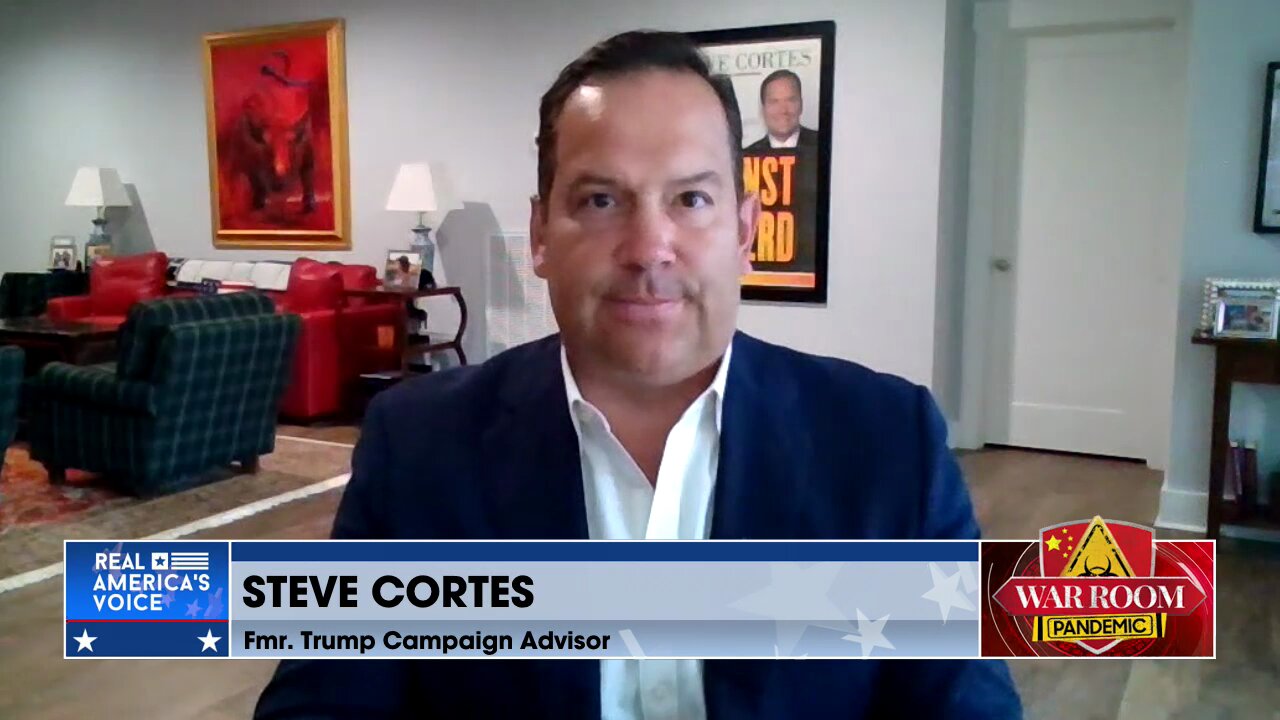
 rumble.com
13:44 min tot clip , section of interest starts at 4:16 min -
rumble.com
13:44 min tot clip , section of interest starts at 4:16 min -
Retailers down 40% last 6 months vs Ratheon stock up 5% last 6 months
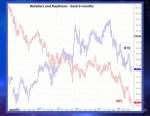
(Comment: When I think of Ratheon. I think of the Atlantic Council and the interests of the military industrial complex. Atlantic Council - Shaping the global future together )

Steve Cortes: Biden’s Misery And Our Populist Solutions
Steve Cortes: Biden’s Misery And Our Populist Solutions
Retailers down 40% last 6 months vs Ratheon stock up 5% last 6 months

(Comment: When I think of Ratheon. I think of the Atlantic Council and the interests of the military industrial complex. Atlantic Council - Shaping the global future together )
marsh
On TB every waking moment
Going down the Atlantic Council rabbit hole, I came across the
2022 Global Energy Forum

Opening Remarks 45:43 min
Day 1
View: https://youtu.be/ufDr39l92Yw
9:25:45 min
Day 2
View: https://youtu.be/DuohGbZq-ig
8:12:15 min
Preparing the United States for a minerals intensive future (EV, Alternative energy, etc.)
View: https://youtu.be/RHk6aUo_9K0
1:04:45 min
2022 Global Energy Forum
- MON, MARCH 28, 2022 • 1:30 PM ET
- UNITED ARAB EMIRATES

Opening Remarks 45:43 min
Day 1
9:25:45 min
Day 2
8:12:15 min
Preparing the United States for a minerals intensive future (EV, Alternative energy, etc.)
1:04:45 min
marsh
On TB every waking moment
25:43 min
Special Address by Tamim Bin Hamad Al Thani, Amir of the State of Qatar | Davos | #WEF22
marsh
On TB every waking moment
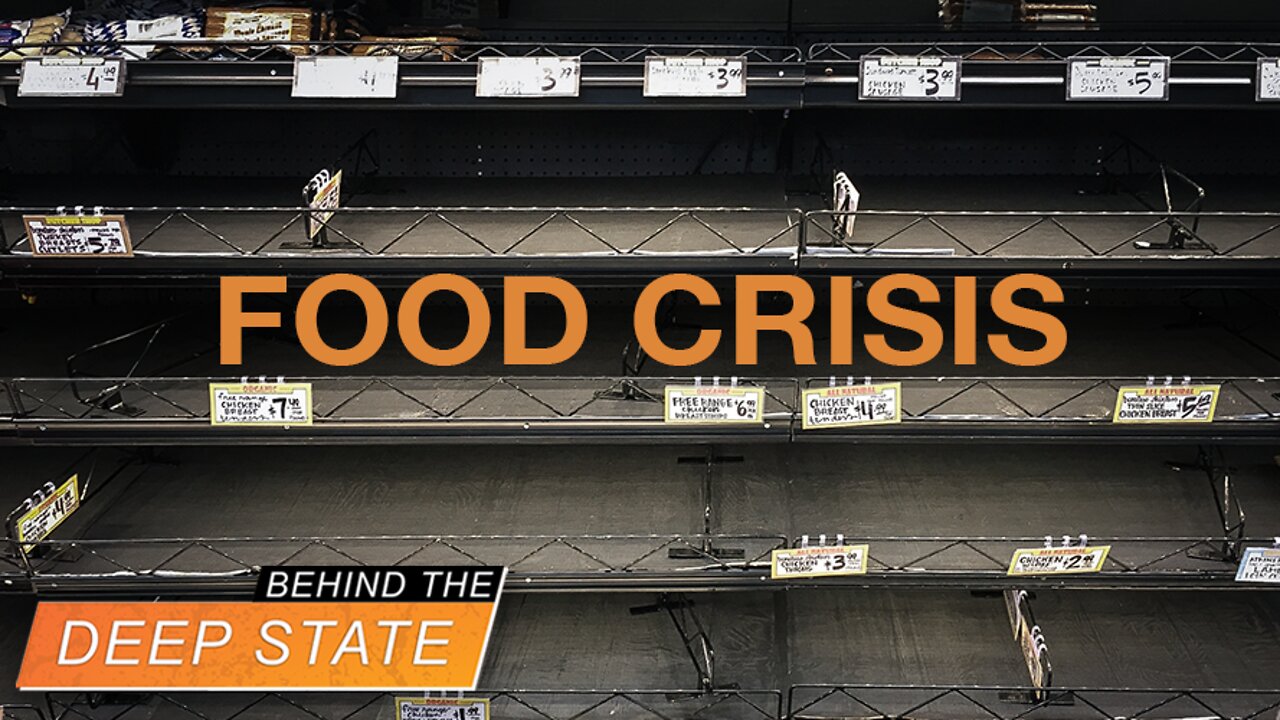
Food Crisis Being Engineered by the Deep State
Catastrophic food shortages and even famine are being engineered by the Deep State in a bid to centralize control over the food supply and ultimately the population of the planet, warns The New Americ
Food Crisis Being Engineered by the Deep State
The New American Published May 23, 2022
Catastrophic food shortages and even famine are being engineered by the Deep State in a bid to centralize control over the food supply and ultimately the population of the planet, warns The New American magazine's Alex Newman in this episode of Behind The Deep State. Key globalist Deep State operatives such as Henry "New World Order" Kissinger have flirted with the idea of food shortages as a population-control weapon for generations. The goals are clear. And now, thanks to deliberate policy decisions taken by Deep State-controlled governments and organizations, a true food crisis of global proportions is emerging. Newman also provides ideas on how to deal with the coming threat--before it's too late. You will want to share this one with your friends and family!
marsh
On TB every waking moment
Battle Plan For PSYCHOLOGICAL WARFARE 1:46 min
Battle Plan For PSYCHOLOGICAL WARFARE
America's Frontline Doctors Published May 23, 2022
Battle Plan For PSYCHOLOGICAL WARFARE
Deception is everything!!
The social engineers have launched a massive PSYWAR against the American people in their long awaited quest for total control and global domination. The best way to fight the PSYWAR is to retaliate with an aggressive INFOWAR. If you are receiving this transmission, you are the resistance
Battle Plan For PSYCHOLOGICAL WARFARE
America's Frontline Doctors Published May 23, 2022
Battle Plan For PSYCHOLOGICAL WARFARE
Deception is everything!!
The social engineers have launched a massive PSYWAR against the American people in their long awaited quest for total control and global domination. The best way to fight the PSYWAR is to retaliate with an aggressive INFOWAR. If you are receiving this transmission, you are the resistance
marsh
On TB every waking moment
CNN's Jake Tapper Cuts Off White House Adviser Attempting To Pin Putin For High Gas Prices 1:09 min
CNN's Jake Tapper Cuts Off White House Adviser Attempting To Pin Putin For High Gas Prices
The Daily Caller Published May 23, 2022
CNN's Jake Tapper Cuts Off White House Adviser Attempting To Pin Putin For High Gas Prices
The Daily Caller Published May 23, 2022
marsh
On TB every waking moment
Masking Issue Finally Resolved 7:25 min
Masking Issue Finally Resolved
America's Frontline Doctors Published May 23, 2022
Masking Issue Finally Resolved
Old episode - playing around testing masks


New Italian study




Masking Issue Finally Resolved
America's Frontline Doctors Published May 23, 2022
Masking Issue Finally Resolved
Old episode - playing around testing masks


New Italian study




Last edited:
raven
TB Fanatic
I've said this before, so I will try it again.Battle Plan For PSYCHOLOGICAL WARFARE 1:46 min
Battle Plan For PSYCHOLOGICAL WARFARE
America's Frontline Doctors Published May 23, 2022
Battle Plan For PSYCHOLOGICAL WARFARE
Deception is everything!!
The social engineers have launched a massive PSYWAR against the American people in their long awaited quest for total control and global domination. The best way to fight the PSYWAR is to retaliate with an aggressive INFOWAR. If you are receiving this transmission, you are the resistance
"You have to engrave the name of the enemy on an iron spike, nail it in the ground, and attach a short chain to your ankle"
Otherwise, they will drag you through every crisis imaginable to take you focus off the problem.
Take Ukraine and look at all the people who are supporting the World Economic Forum, the EU, and the Biden Administration. You cannot oppose them and support them at the same time.
If you are going to support Ukraine, then you support Biden and the WEF
. . . and I know that is hard . . . but you can't have it both ways.
If Ukraine wins, Ukraine storm troopers are going to be the enforcement arm of the WEF.
marsh
On TB every waking moment
ZeroHedge
ZeroHedge - On a long enough timeline, the survival rate for everyone drops to zero
Bird Flu Outbreak Plunges US Egg Production To 7-Year-Low
MONDAY, MAY 23, 2022 - 03:00 PM
Avian influenza has already impacted more than 37 million birds across 34 US states this year.
The fast-spreading virus has sent the production of eggs tumbling and prices at the supermarket soaring.
Bloomberg reports the production of US eggs in April plunged as millions of egg-producing hens were slaughtered to mitigate the virus' spread. The latest data from the USDA shows egg production fell 3.9% to 7.55 billion, while the number of egg-laying birds dropped 5.3% from a year ago.
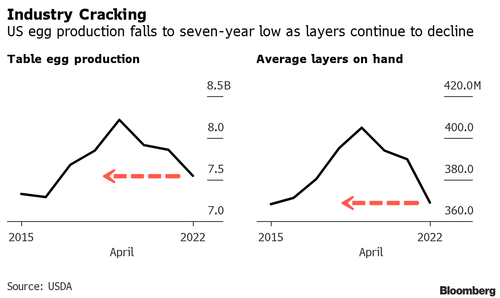
The reduced output will continue to pressure retail prices for a dozen of eggs higher. In April alone, prices jumped 23% from the month before to $2.52. Prices reached levels not seen since early 2016, a period that followed the avian influenza outbreak of 2014-15, which led to a 50% increase in egg prices in the second half of 2015.
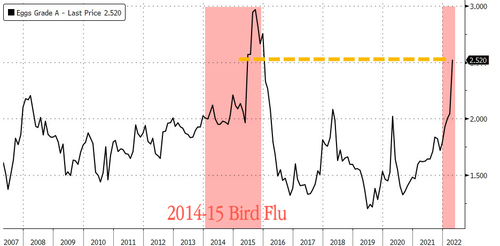
Egg prices could rise more as producers fail to meet increased demand as supplies tighten. The cost of breakfast is soaring. Everything from orange juice to bacon to wheat has jumped in price -- the first meal of the day used to be the most affordable -- not so much anymore.
marsh
On TB every waking moment
ZeroHedge
ZeroHedge - On a long enough timeline, the survival rate for everyone drops to zero
UN Food Head Warns Conditions "Worse" Than Arab Spring As Inflation Riots Spread
MONDAY, MAY 23, 2022 - 02:20 PM
Speaking at the World Economic Forum (WEF) in Davos, Switzerland, David Beasley, executive director at the UN World Food Programme, warned the world's food security conditions are "worse" than what was observed during Arab Spring over a decade ago.

Beasley said even before the Ukraine crisis. A global food crisis was already emerging. Now the crisis is the "worst humanitarian crisis since World War II."
"What happens when you take a nation [Ukraine] that normally feeds 400 million people and sideline that … it's devastating to global food security," he warned."Just when you think the world food crisis couldn't get any worse well over a year ago, you had Ethiopia and Afghanistan, and then the breadbasket of the world [Ukraine] — just got the longest breadlines of the world — and so now because of this crisis, we're taking food from the hungry to give to the starving."
Beasley said if you look at the economic conditions during the Arab Spring in 2011 — conditions today are "actually worse," which has already sparked social unrest in several countries
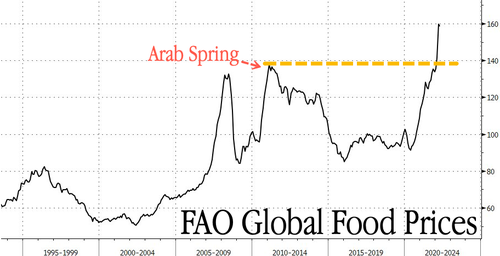
He pointed out that social-economic instabilities are already developing in Sir Lanka, Indonesia, Peru, and Pakistan, adding "that is only a sign of things to come."
There are "49 million people in 43 countries … and those are the countries that we need to be extremely concerned about because that will result in famine, destabilization, and mass migration — if we don't get ahead of this," Beasley said.
Last month, the Rockefeller Foundation, which has closely aligned views with WEF, provided a countdown of six months to when the "massive, immediate food crisis" would unfold.
Another warning from Beasley at Davos.
View: https://twitter.com/i/status/1528678826749878278
.37 min
raven
TB Fanatic
Remember beauty pageants from back in the '70s?
And it seemed like every beauty queen wanted to solve world hunger?
Remember that?
Well, how do you think they doubled the world population?
That's right . . . they solved world hunger.
And now they decide that population is the problem.
Famine isn't the problem.
It is the solution.
And it seemed like every beauty queen wanted to solve world hunger?
Remember that?
Well, how do you think they doubled the world population?
That's right . . . they solved world hunger.
And now they decide that population is the problem.
Famine isn't the problem.
It is the solution.
marsh
On TB every waking moment
ZeroHedge
ZeroHedge - On a long enough timeline, the survival rate for everyone drops to zero
Freedom Of Speech Needs "Recalibration" - Aussie Commissioner Sparks Outrage At WEF
MONDAY, MAY 23, 2022 - 11:20 AM
Australian eSafety commissioner Julie Inman raised eyebrows on Monday, telling the World Economic Forum that there needs to be a "recalibration" of free speech.
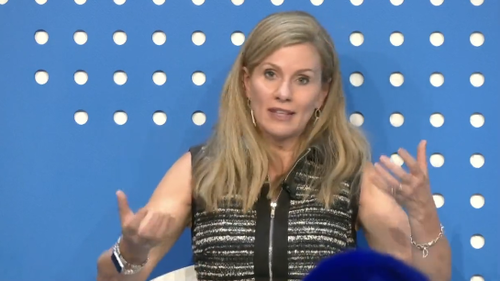
"We are finding ourselves in a place where we have increasing polarization everywhere, and everything feels binary when it doesn't need to be - so I think we're going to have to think about a recalibration of a whole range of human rights that are playing out online - from freedom of speech, to be free from online violence. Or the right of data protection, to the right of child dignity," whatever that last part means.
Watch:
View: https://twitter.com/i/status/1528779966644731906
.27 min
The response to Inman's Orwellian comments were about what one might expect.


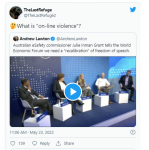

marsh
On TB every waking moment
ZeroHedge
ZeroHedge - On a long enough timeline, the survival rate for everyone drops to zero
Bullwhip Effect Ends With A Bang: Why Prices Are About To Fall Off A Cliff
MONDAY, MAY 23, 2022 - 06:33 AM
It was exactly a year ago, when Deutsche Bank strategist Luke Templeman said that amid the panicked scramble by US wholesalers to stock up on scarce inventory as a result of snarled supply chains, it was only a matter of time before the US economy was roiled by a "bullwhip" (or whiplash) effect.
Some details for those unfamiliar with this concept: the bullwhip effect occurs when a drop in customer demand causes retailers to under stock. In turn, wholesalers respond to a lack of retail orders by understocking themselves. That then causes manufacturers to slow production.
Eventually the reverse occurs. As customer demand comes back, retailers quickly order more goods, often too much, and wholesalers and factories are caught short. Shortages occur, prices increase. Eventually production ramps up at levels that are far beyond equilibrium levels and this cascades down the chain. These violent swings in availability of goods then continue back and forth until an equilibrium is eventually established.
Last May, the beginning of the bullwhip effect was seen in the way retailers and wholesalers managed their inventory levels since the outbreak of covid. Specifically, retailers kept a supply of inventory at a relatively constant level, above that of wholesalers. As covid hit, supply chains from Asia were cut which caused a fright amongst retailers in the West who immediately began to put in orders for more inventory. A whole lot more of it. Subsequent lockdowns saw demand plummet and inventories along with it. In both cases, the actions of wholesalers followed those of retailers by a month or so.
In the context of a starting bullwhip effect, Templeman's conclusion was accurate: "As inventory levels have fallen to multi-decade lows at retailers, there are likely many businesses that will not have enough inventory to satisfy customers as economies recover and pent-up demand is unleashed. This is particularly the case as retailers are far more reliant on just-in-time supply chains than they were in decades past."
Among other things, this is also why last May is when a historic bout of inflation was unleashed (one which not a single career economist or Fed official predicted correctly) as collapsing inventories and lack of restocking by jammed up supply chains meant that prices for goods would keep rising and rising and rising. And they did.
Of course, for much of the past year, the big story was the congestion at west coast ports due to both external (China covid breakouts, port closures, changing legislation) and internal factors (lack of port workers, downstream supply jams including trucking and trains, etc) but that has now changed and as the latest Supply Chain Congestion Monitor report from JPMorgan (available to pro subscribers in the usual place) shows, the number of ships at anchor and on approach to L.A. and Long Beach has collapsed since the January high mark, and is back to levels first seen at the start of the covid pandemic.
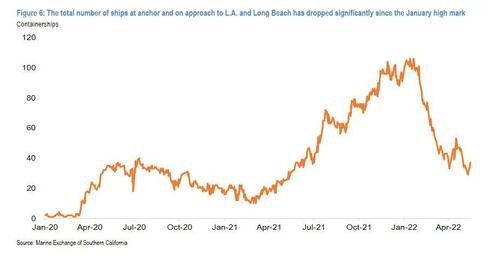
Why does this matter? Well, for a simple but critical reason: if one year ago we saw the hyperinflationary start of the bullwhip effect, we have entered the terminal phase of the "bullwhip effect", where plunging inventory-to-sales ratios reverse violently higher, where supply chains unclog suddenly and rapidly amid a sudden chill in the economy, and where prices for so-called "core" goods collapse almost overnight, even as non-core prices (food and energy) explode even higher.
This is how Freight Waves discussed this effect on Friday when commenting on the recent dire earnings (and outlook) from the largest US retailers such as Walmart and Target, which saw their prices crater as management warned that inflation is now crippling demand and snuffing profit margins:
How much higher? A quick look at the latest data reveals the following stunning chart of the Inventory to Sales ratio at the Walmarts of the world at the highest level since just before the deflationary flashbang that was the Global Financial Crisis:"furniture, home furnishings and appliances, building materials and garden equipment, and a category known as “other general merchandise,” which includes Walmart and Target, among others, reported higher inventory-to-sales ratios, according to government data analyzed by Michigan State."
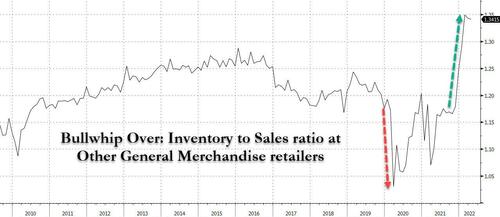
Think: widespread inventory liquidations.
As Freight Waves continues, "the change has happened fast, according to Jason Miller, logistics professor at MSU’s Eli Broad College of Business. As of November, inventory-to-sales ratios were at pre-COVID levels, Miller said. They have since exploded upward. Miller said he expects a “cooldown” in retailer order volumes, even if inflation-adjusted sales stay constant, as retailers look to reduce their existing stock."
And here is the punchline: Miller "also expects retailers to launch major discounting programs to expedite the inventory burn."
In short: we are about to see the mother of all liquidations as retailers scramble to unload inventory in a time off rampant demand destruction. The immediate result is the freight recession that was first (correctly) forecast by FreightWaves CEO Craig Fuller at the end of March and which is now coming true as the crashing stock price of countless trucker and other freight stocks has demonstrated. Some more on this:
high inventory levels are an expected occurrence and should be welcomed. In a Tuesday note, Amit Mehrotra, transport analyst at Deutsche Bank, said rising buffer stock is part of retailers’ desire to have goods available when consumers scan the shelves. Mehrotra added, however, that the data points translate into a likely slowdown in freight flows in the coming months and quarters.
The latest data also confirms what FreightWaves' Fuller said in a subsequent post when he wondered if "Deflation Was Next" as "the Bullwhip was about do the Fed's job on inflation."He said that a recession is already priced into most transportation equities, noting that the shares of most trucking companies are higher over the past 30 days while the broader market is about 7% lower.
To be sure, not every product will see its price cut: commodities, whose bullwhip effect take much longer to manifest itself, usually lasting several years in either direction, are only just starting to see their price cycle higher. However, other products - like those carried by the Walmarts and Targets of the world - are about to see a deflationary plunge the likes of which we have not seen since the global financial crisis as retailers commence a voluntary destocking wave the likes of which have not been seen in over a decade.
raven
TB Fanatic
pay attention - Humans do not have natural god given rights.ZeroHedge
ZeroHedge - On a long enough timeline, the survival rate for everyone drops to zerowww.zerohedge.com
Freedom Of Speech Needs "Recalibration" - Aussie Commissioner Sparks Outrage At WEF
MONDAY, MAY 23, 2022 - 11:20 AM
Australian eSafety commissioner Julie Inman raised eyebrows on Monday, telling the World Economic Forum that there needs to be a "recalibration" of free speech.

"We are finding ourselves in a place where we have increasing polarization everywhere, and everything feels binary when it doesn't need to be - so I think we're going to have to think about a recalibration of a whole range of human rights that are playing out online - from freedom of speech, to be free from online violence. Or the right of data protection, to the right of child dignity," whatever that last part means.
Watch:
View: https://twitter.com/i/status/1528779966644731906
.27 min
The response to Inman's Orwellian comments were about what one might expect.
View attachment 341007
View attachment 341011
View attachment 341012
View attachment 341013
marsh
On TB every waking moment
ZeroHedge
ZeroHedge - On a long enough timeline, the survival rate for everyone drops to zero
White House Mulls Tapping Emergency Diesel Stockpile To Address East Coast Crisis
MONDAY, MAY 23, 2022 - 08:00 AM
The East Coast of the U.S. has some of the lowest seasonal diesel inventory on record. Retail diesel prices at the pump from the Washington–Baltimore metropolitan area to New York City are well over $6 a gallon, a record high. Major trucking companies warned drivers of imminent shortages as the summer driving season begins later this week. Now the Biden administration is scrambling and has proposed an emergency action to drain a critical stockpile to mitigate the massive supply crunch.
A senior White House official told CNN that President Biden could soon release diesel from the Northeast Home Heating Oil Reserve to arrest record-high prices for diesel across the Mid-Atlantic and Northeast regions.
The senior official said President Biden is prepared to authorize the release if conditions deteriorate, adding the supply crunch has stabilized in recent days.
What's alarming is East Coast diesel inventories have fallen to the lowest levels since 1990. National stocks are around a two-decade low.
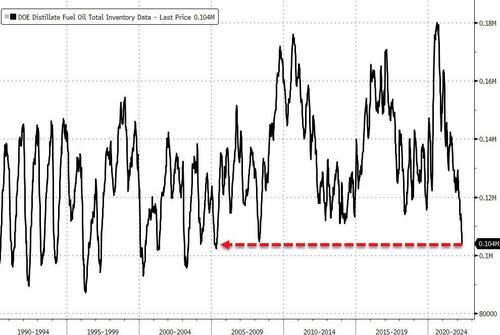
"The system is definitely under strain," the senior White House official said.
Tight fuel supplies are due to many factors. Two major ones are declining refinery capacity and increased fuel shipments to Europe.
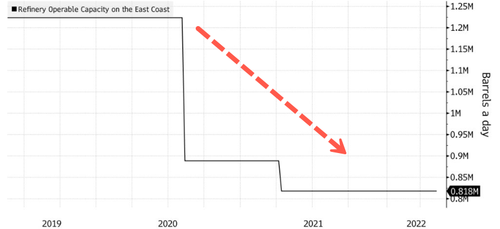
CNN notes, "the release would be limited by the relatively small size of the reserve, which only contains 1 million barrels of diesel — equal to about a day's worth of supply in the region."
"It's small potatoes. It might buy a couple of weeks or even months, but it doesn't solve the underlying issues," Andy Lipow, president of Lipow Oil Associates, said.
Major trucking firms have prepared drivers for diesel shortages in the Northeast. Also, refinery and fuel station owner John Catsimatidis warned: "I wouldn't be surprised to see diesel being rationed on the East Coast this summer."
As of Monday morning, retail diesel prices in New York stood around $6.515, a record high and doubling of price from a year ago.
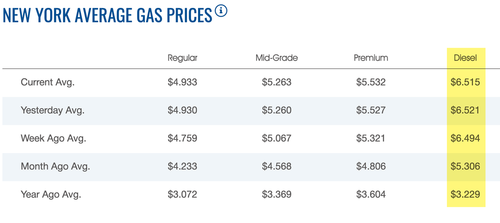
The East Coast diesel shortage appears dire if the Biden administration has to propose a plan to drain another strategic stockpile. So far, the release of a million barrels of crude per day from the SPR has yet to arrest WTI prices.
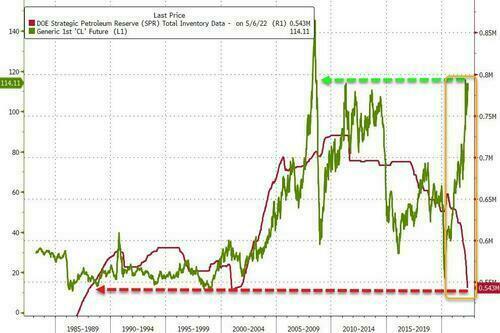
Record high fuel prices have hampered Biden's approval rating -- perhaps -- why he's considering another cunning attempt to lower pump prices.
marsh
On TB every waking moment
ZeroHedge
ZeroHedge - On a long enough timeline, the survival rate for everyone drops to zero
It's Not Just The USA: The Economic Instability Is Global
MONDAY, MAY 23, 2022 - 03:20 PM
Authored by Paul Tolmachev via The Mises Institute,
The actions of the authorities in developed countries, essentially an extension of the Keynesian economic policy discourse, have brought the economies into disrepute. These actions consist of immense stimulus and virtually unfunded government indexation of voter income in the face of expected impoverishment amid COVID, lockdowns, and other global problems.
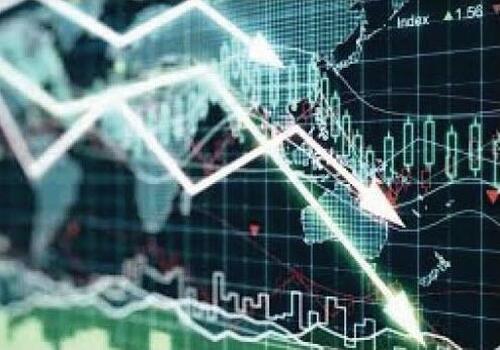
The government is making money cheaper, just to maintain electoral support. This leads to a dispersal of demand and a proliferation of zombie companies, it distorts the incentives for healthy competition, it reduces business efficiency, and it kills the innovation factor of economic growth. Most importantly: it creates leverage - the dominance of needs over opportunities, demand over supply-in other words, it leads to dramatic market disequilibrium.
Before COVID times, such imbalances over the past 20 years were bought with new leverage, and the imbalances went away for a while, giving birth to inevitable new imbalances in the future. The Austrian cycles perfectly describe this process, its starting points and its consequences. In fact, this leftist social agenda for buying electoral loyalty is a new political doctrine based on simplification, and most importantly, on the abolition of any concern for tomorrow.
In СOVID times, however, all that has changed. Another injection of mega liquidity, the cheapening of money by all possible means - from direct budgetary donations to the inflating of the Fed's balance sheet - occurred against a background of blocked demand, rather than falling due to economic stagnation. As a result, the savings of all agents increased abnormally, people stopped wanting to work, the flow of investment into the stock market and into financial assets increased, creating hyperinflation in them and moving them away from their fair value.
The assumption was that, once the restrictions were lifted, the intensified and unmet buying intentions would sharply accelerate the economy, because the capacity and potential of supply is enormous: supply has the capacity to satisfy demand, synergistically accelerating the economy. This has not happened, however, because there have been structural shifts as a result of excessive lockdowns: gaps in supply chains, reduced labor force participation, and labor shortages in general, hypertrophied growth of commodity markets, and geopolitical tensions that reinforce all of the above factors. As a result, supply is unable to meet the demand because of cheap money, and inflation is again eating away at the economy.
At the same time, instead of reducing its clumsy intervention, the government, on the contrary, increases social programs and government spending in the form of infrastructure projects. In this way it depresses business through the inevitable increase in the tax burden and further contributes to the compression of supply, reducing efficiency, the desire to invest and, in general, worsening business expectations and expanding the mandate and the number of bureaucratic entities.
Against this same backdrop, by continuing its conciliatory policy with resource autocracies, the government is forcing a green agenda at the worst possible time, underfunding both conventional and alternative energy, which cannot cover the current need for the capacity provided by conventional energy. A cursory reading of Klaus Schwab's The Great Reboot is enough to understand the inadequacy of such a utopian concept, the adherence to which, as we can see, leads to anti-utopian consequences.
The result was a geopolitical tension caused by differing interests, preferences and expectations of global players: Russia, as a resource autocracy, saw a window of opportunity and the vulnerability of the economic position of the Collective West - and played the tactical card. In the short horizon, the calculation proved correct: on the whole, post-conservative externalities and leftist populist policies of Western power elites weakened developed economies, led to stagflation and increased the threat of recession. The blow to the Western world in the form of the military conflict in Eastern Europe and its aftermath was well-timed for the resource autocracy itself, which from within needed a new impetus for self-preservation and confirmation of the regime's legitimacy by the population.
What do we get in the end?
We end up with structural shifts, when all the post-Soviet problems multiply manifold.
Stagflation is already a fact today; recession is inevitable tomorrow. Social discontent, which will inevitably happen and is already taking place in various parts of the Western world, will force governments to continue to care about today without thinking about tomorrow - and to continue the policies of populism and leftist expansive discourse, which will inevitably lead to even greater leverage and exacerbate economic, and therefore social, imbalances.
Commodity inflation will not end quickly, since significant exporters of raw materials are in conflict and alternative channels of resource importation have not been established. New energy is clearly insufficient against the background of limiting imports of old energy from the resource autocracy. This means that traditional energy supplies must be recanalized, which is inevitably accompanied by rising costs and acceleration of inflation. Supply is under stress from rising costs - logistical lockups, commodity inflation and labor shortages. An additional stress is on the way, or rather, already in the room - rising credit costs and a potential drop in demand.
At the same time, China, as the embodiment of an alternative sociopolitical pole, benefits in the short horizon. Against the background of universal turbulence and socio-economic disequilibria in the Western world, the ability to centrally stimulate the market in the initial stages of the capitalist impulse can be quite a success story. At this point, there are still no acute dependencies on state injections, no meaningful imbalances in supply and demand dynamics, and no ideological constraints on imported raw materials.
China, with its own problems of growing state capitalism in the form of hypertrophied infrastructure capex and an authoritarian political frame leading to market and innovation inefficiencies over the long haul, now has a distinct advantage. It lies in the possibility of directive economic management and linear monetary and fiscal incentives. This is an advantage that Western states no longer have and that, by the way, China itself will soon lose, because games of "big government" do not succeed for too long. They always end in one thing: social and economic collapse in its various forms and outcomes.
As a result, Western economies are faced with a dilemma as never before: to continue state expansion and addiction treatment with a new dose, or to start bringing the economy into balance. Of course, this is associated with tough and unpopular political decisions, all the more painful in a situation of global tension. But this is precisely the situation in which politicians show their true skills, namely the ability to convince voters to sacrifice something today for the sake of a better tomorrow. Otherwise, there will be no tomorrow at all.
So far, we have been assured of only one thing: we are living in one day and there is no tomorrow. In short, it's like Keynes: we are all going to die in the long run. I think we've been through this before.
marsh
On TB every waking moment
ZeroHedge
ZeroHedge - On a long enough timeline, the survival rate for everyone drops to zero
Five Major Challenges Facing The Energy Industry
MONDAY, MAY 23, 2022 - 06:40 PM
Authored by Irina Slav via OilPrice.com,
Record-high prices at the pump, a looming diesel shortage right when the summer season is starting, and an uncooperative OPEC are probably reasons for many headaches among government officials around the world.

Yet these are, in fact, manifestations of deeper problems in the energy industry.
Underinvestment
In the past decade or so, Europe and, to a lesser but no less significant extent, North America, have made it their mission to reduce their reliance on fossil fuels and increase their reliance on renewable energy.
This has spurred an investor exodus from oil and gas and the emergence of the so-called ESG investing trend. Money for new oil and gas developments has become more difficult to tap as banks join the ESG movement, and companies have had to cut back on spending.
Saudi Arabia's oil minister warned that underinvestment in oil and gas would have a boomerang effect on consumers earlier this year, and he is not the only one. Many OPEC officials have made the same warning but, apparently, to no avail. After all, none other than the International Energy Agency said last year the world does not need new oil and gas exploration because we won't be needing any more new oil or gas supply.
Of course, it was only a few months later that the IEA changed its tune, calling on OPEC to boost production, and it demonstrated one of the harsh realities of the energy industry: you cannot reverse a process that has been going on for years in a matter of months.
Low discovery rates
A topic that doesn't get much talked about, the average rate of new oil and gas discoveries is, in a way, comparable to the average conversion rate of solar panels: it is well below 30 percent.
Bloomberg recently reported that three wells that Shell had drilled offshore Brazil had come up dry. The supermajor had paid $1 billion for drilling rights in the area and had spent three years drilling to come up empty-handed. Exxon had also failed to tap any significant oil reserves in its Brazilian blocks, which cost it $1.6 billion.
The news highlights the risky nature of oil and gas exploration even in places like Brazil, which has been touted as the next hot spot in the industry, probably alongside Guyana. Brazil has become a magnet for supermajors because of its prolific presalt zone, but, as one local energy consultant told Bloomberg, the big discoveries have already been made—back when the discovery rate was close to 100 percent.
The average successful discovery rate for the oil and gas industry is much lower than that, however, at 24.8 percent, according to Bloomberg. And there are fewer and fewer big discoveries to be made.
Production cost inflation
Broader inflation trends, in large part driven by soaring energy costs, have not passed the energy industry itself. In the U.S. shale patch, production costs have risen by some 20 percent.
Two companies recently warned they would be reporting higher costs for their second quarters, Continental Resources and Hess Corp, and they are far from the only ones experiencing these higher costs.
Shortages of raw materials such as frac sand and, earlier this year, steel piping for wells, are one reason for the production cost inflation, not just in the shale patch but everywhere where these raw materials are used in oil fields. A shortage of labor is a special problem for the U.S. shale patch, too, helping to drive production costs higher. Lingering supply chain problems from the pandemic are also in the mix.
The bigger problem is that the industry is not expecting any respite in the coming months, either, as Argus recently reported, citing oil and gas executives. The production cost squeeze comes at a time when the federal government really needs more oil and gas, which is probably the worst possible time as it has discouraged drillers further from spending more on new drilling.
Cyberattacks
Cybersecurity has become a cause for concern in the energy industry in the past few years as cyberattacks have multiplied significantly. The Colonial Pipeline hacking really helped out things in perspective on the cybersecurity front, but little action followed, it seems.
A brand new survey by DNV, the Norwegian risk assessment and quality assurance consultancy, revealed this week that the industry is quite uneasy about cyberthreats and, what's worse, not really prepared to handle them.
According to the study, 84 percent of executives expect cyberattacks will lead to physical damage to energy assets, while more than half—54 percent—expect cyberattacks to result in the loss of human life. Some 74 percent of the respondents expect environmental damage as a result of a cyberattack. And only 30 percent know what to do if their company becomes a target of such an attack.
Geopolitics
The most chronic risk in the energy industry, geopolitics is never far away when prices start swinging wildly or, as is the case right now, remain stubbornly high. The prospect of an EU oil embargo on Russia, although dimming in the past few days, is one big bullish factor for oil prices. The lack of progress on Iran nuclear talks is another. And then there is, of course, OPEC's evident unwillingness to respond to calls from the West for more oil.
Russia itself does not seem bothered by the embargo prospects at all. "The same oil that they [the EU countries] bought from us will have to be purchased elsewhere, and they will pay more, because the prices will definitely rise; and once the cost of delivery and freight increase, it will be necessary to invest in building the corresponding infrastructure," Deputy Prime Minister Alexander Novak said this week.
Iran is meanwhile boosting its oil exports, which go almost exclusively to China. The country has signaled it will not agree to a deal with the U.S. unless the U.S. meets its demands, and it appears that the ball is now in Washington's court. In the meantime, China will have Iranian oil, but no one else will.
For the U.S., the price problem has become so dire that now President Biden is seeking a meeting with the Saudi Crown Prince Mohammed, whom he has consistently refused to communicate with, instead communicating with his father, King Salman. Biden has also been openly critical of MbS for his alleged role in the killing of a dissident Saudi journalist, calling the Kingdom a "pariah" with "no redeeming social value." Geopolitics can be awkward.
marsh
On TB every waking moment
THE PLANNED OIL SHORTAGE FINALLY CALLED OUT AT A HEARING "THEY'RE SHUTTING IT DOWN" 2:14 min
THE PLANNED OIL SHORTAGE FINALLY CALLED OUT AT A HEARING "THEY'RE SHUTTING IT DOWN"
They're shutting everything down! They're now saying WHEAT is causing global warming too so now we have 10 weeks of wheat left! They're destroying EVERYTHING using their FAKE climate change scam as an excuse! Something better happen to them for this shit! These people are committing high treason
(Senator Manchin reads from an Interior release indicating "a proposed program is not a decision to issue any specific leases or to authorize any drilling or development." It shuts it down. 5 year offshore program plan by June 30.
^^^^^^^
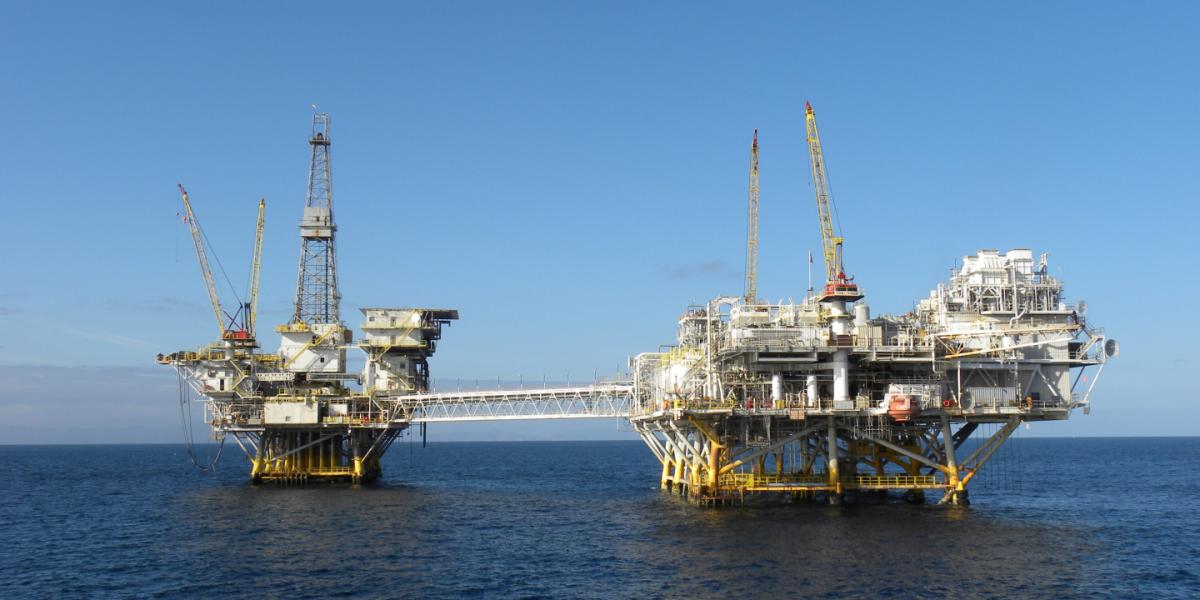
 www.doi.gov
www.doi.gov
Press Releases
Share
Secretary Haaland Provides Updates on Offshore Leasing Program During Senate Testimony
5/19/2022
Last edited 5/19/2022
Date: Thursday, May 19, 2022
Contact: Interior_Press@ios.doi.gov
THE PLANNED OIL SHORTAGE FINALLY CALLED OUT AT A HEARING "THEY'RE SHUTTING IT DOWN"
They're shutting everything down! They're now saying WHEAT is causing global warming too so now we have 10 weeks of wheat left! They're destroying EVERYTHING using their FAKE climate change scam as an excuse! Something better happen to them for this shit! These people are committing high treason
(Senator Manchin reads from an Interior release indicating "a proposed program is not a decision to issue any specific leases or to authorize any drilling or development." It shuts it down. 5 year offshore program plan by June 30.
^^^^^^^

Secretary Haaland Provides Updates on Offshore Leasing Program During Senate Testimony | U.S. Department of the Interior
During testimony before the U.S Senate Committee on Energy and Natural Resources today, Secretary of the Interior Deb Haaland confirmed that, despite delays in implementation from the previous Administration, the Interior Department will release the Proposed Program - the next step in the...
Press Releases
Share
Secretary Haaland Provides Updates on Offshore Leasing Program During Senate Testimony
5/19/2022
Last edited 5/19/2022
Date: Thursday, May 19, 2022
Contact: Interior_Press@ios.doi.gov
WASHINGTON — During testimony before the U.S Senate Committee on Energy and Natural Resources today, Secretary of the Interior Deb Haaland confirmed that, despite delays in implementation from the previous Administration, the Interior Department will release the Proposed Program - the next step in the five-year offshore energy planning process - by June 30, 2022, which is the expiration of the current program. A Proposed Program is not a decision to issue specific leases or to authorize any drilling or development.
“The previous Administration stopped work on the new five-year plan in 2018, so there has been a lot to do to catch up. Varying, conflicting litigation has also been a factor. As we take this next step, we will follow the science and the law, as we always do. This requires a robust and transparent review process that includes input from states, the public and Tribes to inform our decision-making. We take this responsibility seriously without any pre-judgment of the outcome,” said Secretary Haaland.
The National Outer Continental Shelf (OCS) Oil and Gas Leasing Program, developed by the Bureau of Ocean Energy Management, establishes a five-year schedule for its oil and gas leasing program as required by the Outer Continental Shelf Lands Act. More information on the steps in the development of a five-year plan can be found on BOEM's website.
“The previous Administration stopped work on the new five-year plan in 2018, so there has been a lot to do to catch up. Varying, conflicting litigation has also been a factor. As we take this next step, we will follow the science and the law, as we always do. This requires a robust and transparent review process that includes input from states, the public and Tribes to inform our decision-making. We take this responsibility seriously without any pre-judgment of the outcome,” said Secretary Haaland.
The National Outer Continental Shelf (OCS) Oil and Gas Leasing Program, developed by the Bureau of Ocean Energy Management, establishes a five-year schedule for its oil and gas leasing program as required by the Outer Continental Shelf Lands Act. More information on the steps in the development of a five-year plan can be found on BOEM's website.
marsh
On TB every waking moment
BILL GATES COMPILATION: Replacing Nature with Artificial Reality 7:46 min
BILL GATES COMPILATION: REPLACING NATURE WITH ARTIFICIAL REALITY
(The pies in which Bill Gates has stuck his fingers)
BILL GATES COMPILATION: REPLACING NATURE WITH ARTIFICIAL REALITY
(The pies in which Bill Gates has stuck his fingers)
marsh
On TB every waking moment
Germ Games .... We've been played 1:03:22 min
GERM GAMES .... WE'VE BEEN PLAYED
GERM GAMES…WE’VE BEEN PLAYED (sorry about the caps - theirs not mine)
“IT WAS ALL REHEARSED…OVER AND OVER AGAIN”
BILL GATES LIED TO THE BBC IN APRIL 2020 SAYING “WE DIDN’T SIMULATE THIS WE DIDN’T PRACTICE” WHEN FOR MORE THAN 10 YEARS HE HAD BEEN SPONSORING SIMULATIONS OF
PANDEMIC OUTBREAKS!
IN THIS VIDEO, HOWEVER, WE COVER A LOT MORE THAN BILL GATES! GOING BACK TO 1999 WE GO IN DEPTH COVERING MORE THAN 10 SIMULATIONS CONDUCTED BY THE LIKES OF BILL GATES AND THE USUAL PLAYERS FROM THE INTELLIGENCE COMMUNITY, MILITARY, BIG TECH, AND BIG PHARMA INDUSTRIAL COMPLEX.
.
WE ALSO EXPLAIN THE NEFARIOUS ROLE THAT JOHNS HOPKINS AND THE WORLD ECONOMIC FORUM HAVE PLAYED.
DESIGNED TO LOOK LIKE REAL AND GENUINE REACTIONS TO A REAL PANDEMIC, THIS VIDEO REVEALS THAT WHAT HAS TAKEN PLACE IS MORE LIKE ADHERENCE TO A WELL CRAFTED SCRIPT.
WHO CRAFTED THE SCRIPT? WHO BENEFITED? WHO GAINED POWER? WHO BECAME RICHER IN PROCESS?
WHY DO THE RESPONSES TO OUTBREAKS ALWAYS INVOLVE MORE AND MORE AUTHORITARIANISM? WHY MORE AND MORE CENSORSHIP?
SPOILER ALERT: AFTER VIEWING THIS DOCUMENTARY YOU WILL BE INOCULATED AGAINST MEDICAL PROPOGANDA PAST, PRESENT, AND FUTURE.
YOU WILL ALSO WANT TO SHARE THIS CONTENT WITH AS MANY PEOPLE AS YOU CAN.
WITH THE WHO NEGOTIATING YOUR NATION’S NATIONAL SOVEREIGNTY AND A NEW “POX” LOOMING ON THE HORIZON GERM GAMES WILL PUT IT ALL IN PERSPECTIVE. TO BE FORE WARNED IS TO BE FORE ARMED.
LEARN THE TRUTH ABOUT BILL GATES, JOHNS HOPKINS, WORLD ECONOMIC FORUM, THE CIA, AND OTHER PLAYERS…
Ohioforfreedom
(Major expose on the history of pandemic preparedness simulations and the global health architecture underlying it. I confess, I fell asleep in my chair half way through it.)
GERM GAMES .... WE'VE BEEN PLAYED
GERM GAMES…WE’VE BEEN PLAYED (sorry about the caps - theirs not mine)
“IT WAS ALL REHEARSED…OVER AND OVER AGAIN”
BILL GATES LIED TO THE BBC IN APRIL 2020 SAYING “WE DIDN’T SIMULATE THIS WE DIDN’T PRACTICE” WHEN FOR MORE THAN 10 YEARS HE HAD BEEN SPONSORING SIMULATIONS OF
PANDEMIC OUTBREAKS!
IN THIS VIDEO, HOWEVER, WE COVER A LOT MORE THAN BILL GATES! GOING BACK TO 1999 WE GO IN DEPTH COVERING MORE THAN 10 SIMULATIONS CONDUCTED BY THE LIKES OF BILL GATES AND THE USUAL PLAYERS FROM THE INTELLIGENCE COMMUNITY, MILITARY, BIG TECH, AND BIG PHARMA INDUSTRIAL COMPLEX.
.
WE ALSO EXPLAIN THE NEFARIOUS ROLE THAT JOHNS HOPKINS AND THE WORLD ECONOMIC FORUM HAVE PLAYED.
DESIGNED TO LOOK LIKE REAL AND GENUINE REACTIONS TO A REAL PANDEMIC, THIS VIDEO REVEALS THAT WHAT HAS TAKEN PLACE IS MORE LIKE ADHERENCE TO A WELL CRAFTED SCRIPT.
WHO CRAFTED THE SCRIPT? WHO BENEFITED? WHO GAINED POWER? WHO BECAME RICHER IN PROCESS?
WHY DO THE RESPONSES TO OUTBREAKS ALWAYS INVOLVE MORE AND MORE AUTHORITARIANISM? WHY MORE AND MORE CENSORSHIP?
SPOILER ALERT: AFTER VIEWING THIS DOCUMENTARY YOU WILL BE INOCULATED AGAINST MEDICAL PROPOGANDA PAST, PRESENT, AND FUTURE.
YOU WILL ALSO WANT TO SHARE THIS CONTENT WITH AS MANY PEOPLE AS YOU CAN.
WITH THE WHO NEGOTIATING YOUR NATION’S NATIONAL SOVEREIGNTY AND A NEW “POX” LOOMING ON THE HORIZON GERM GAMES WILL PUT IT ALL IN PERSPECTIVE. TO BE FORE WARNED IS TO BE FORE ARMED.
LEARN THE TRUTH ABOUT BILL GATES, JOHNS HOPKINS, WORLD ECONOMIC FORUM, THE CIA, AND OTHER PLAYERS…
Ohioforfreedom
(Major expose on the history of pandemic preparedness simulations and the global health architecture underlying it. I confess, I fell asleep in my chair half way through it.)
Last edited:
marsh
On TB every waking moment
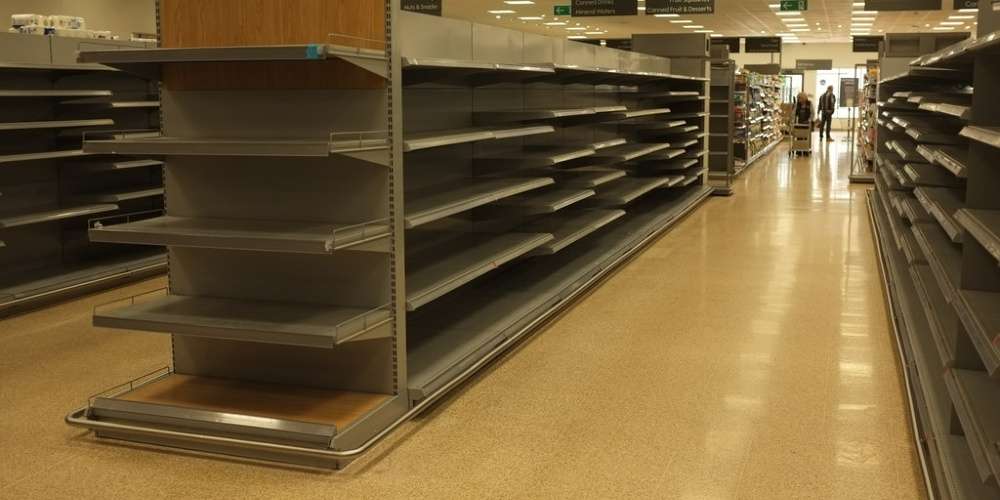
The Apocalyptic Global Food Crisis That We Were Told to Prepare for Has Already Started in 2022
There isn’t going to be enough food for everyone this year. We have been waiting for the nightmarish global food
 uncanceled.news
uncanceled.news
The Apocalyptic Global Food Crisis That We Were Told to Prepare for Has Already Started in 2022
by Michael Snyder
May 24, 2022
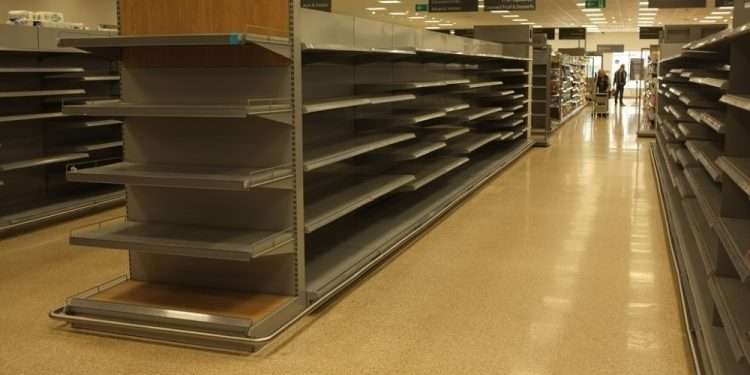
There isn’t going to be enough food for everyone this year. We have been waiting for the nightmarish global food crisis that so many have warned us about, but we don’t have to wait for it anymore because it is already here. Millions upon millions of people around the globe will be desperately hungry tonight, but what we are experiencing right now is just the tip of the iceberg because things will be so much worse by the end of 2022. If you don’t want to believe me, hopefully you will believe some of the experts that I quote in this article.
For example, the CEO of Gro Intelligence just told the UN Security Council that we are facing a “seismic” crisis that will reach an extremely painful phase in about 10 weeks…
The world has only 10 weeks’ worth of wheat left to deal with the crisis, according to Sara Menker, CEO of Gro Intelligence.
“This is seismic,” Menker said during a special meeting of the U.N. Security Council.
Of course many others are issuing similar warnings. A top aide to Vladimir Putin named Maksim Oreshkin says that a worldwide famine “will occur closer to autumn”…“Even if the war were to end tomorrow, our food security problem isn’t going away anytime soon without concerted action.”
On the other side of the conflict, Ukrainian President Volodymyr Zelenskyy is warning that the war in his nation is going to have a catastrophic impact all over the globe…“It is important that in the conditions, for example, of a global famine that will occur closer to autumn, by the end of this year all over the world, Russia should not suffer, but be fully provided with food,” Oreshkin said.
“Russia has blocked almost all ports and all, so to speak, maritime opportunities to export food – our grain, barley, sunflower and more. A lot of things,” Zelenskyy said Saturday. “There will be a crisis in the world. The second crisis after the energy one, which was provoked by Russia.”
Let me give you one more source. The head of the UN World Food Program is telling us that global food shortages are “worse” than anything that we witnessed back in 2011…“Now it will create a food crisis if we do not unblock the routes for Ukraine, do not help the countries of Africa, Europe, Asia, which need these food products,” he added.
He is particularly concerned about the lack of exports from Ukraine, because that country “normally feeds 400 million people”…Speaking at the World Economic Forum (WEF) in Davos, Switzerland, David Beasley, executive director at the UN World Food Programme, warned the world’s food security conditions are “worse” than what was observed during Arab Spring over a decade ago.
This crisis is very real, and it is going to affect every man, woman and child on the entire planet.“What happens when you take a nation [Ukraine] that normally feeds 400 million people and sideline that … it’s devastating to global food security,” he warned.
The truth is that we were heading toward a horrifying global food crisis even before the war in Ukraine erupted, and that is because fertilizer prices have gone absolutely crazy. Of course the war has made things even worse, because Russia alone normally accounts for approximately 20 percent of all global nitrogen fertilizer exports. And it would be extremely difficult to overstate the importance of nitrogen fertilizer…
In fact, according to noted Canadian energy researcher Vaclav Smil, two-fifths of humanity –more than three billion people—are alive because of nitrogen fertilizer, the main ingredient in the Green Revolution that supercharged the agricultural sector in the 1960s. The chemical fertilizer trifecta that tripled global grain production—nitrogen (N), phosphorus (P), and potassium (K)—enabled the greatest human population growth the planet has ever seen. Now, it is in short supply, and farmers, fertilizer companies, and governments around the globe are scrambling to avert a seemingly inevitable tumble in crop yields.
Here in the United States, soaring fertilizer prices are putting an extraordinary amount of financial stress of our farmers.“I’m not sure it’s possible any more to avoid a food crisis,” says World Farmers’ Organization President Theo de Jager. “The question is how wide and deep it will be. Most importantly, farmers need peace. And peace needs farmers.”
One farmer in Indiana named Rodney Rulon is horrified by how much more he has to pay this year…
Rodney Rulon is better off than many farmers this year. A progressive farmer in Arcadia, Indiana, he has been using no-till techniques, cover crops, and chicken litter on his family’s 7,200 acres of corn and soybean fields since 1992. Combined with extensive soil testing each year, he’s cut his chemical fertilizer use 20 to 30 percent, he says—but it’s still his largest input.
Most farmers in the western world will bite the bullet and pay the higher prices.“We’re making big cuts to what we’re spending on fertilizer this year,” Rulon says. “It’s $1,200 a ton for P and K. It was $450 last year. Nitrogen was $500-550 a ton last year. Now it’s well over $1,000. You just took our biggest expense and doubled it.”
But in poorer nations all over the globe it is going to be a different story. Many farmers in those countries will either be greatly cutting back on fertilizer or won’t be using any at all this year.
As a result, production will be way down. And that will mean that global food supplies will be getting tighter and tighter.
You may be tempted to think that hunger is an issue for the other side of the planet, but the reality of the matter is that it is already starting to hit home in some of the wealthiest nations.
For example, one recent survey found that approximately a quarter of all Britons are already “skipping meals”…
A quarter of Britons have resorted to skipping meals as inflationary pressures and a worsening food crisis conflate in what the Bank of England recently dubbed an “apocalyptic” outlook for consumers.
Here in the United States, the nationwide out of stock level for baby formula just hit another alarming new high…More than four in five people in the U.K. are worried about rising living costs and their ability to afford basics necessities like food and energy over the coming months, according to a new survey released Tuesday.
Out-of-stock percentage for baby formula stood at 45% nationwide for the week ending on May 15, according to retail data firm, Datasembly.
Sadly, this is just the beginning.In April, baby formula shortages hit 30% before jumping to 40% at the end of the month, according to Datasembly. By early May, the out-of-stock rate rose to 43%.
The real problem will be the food that is not grown and not harvested in the months ahead.
Winter wheat will soon be harvested in the U.S., and thanks to the historic drought in the western half of the country it is being projected that the total amount harvested will be “the smallest since 1963”…
In 1963, the population of the United States was 189 million.Some farmers already are writing off losses from parched grains. The US Department of Agriculture expects lower yields in Kansas, the top-growing state for hard red winter wheat, a staple relied on for bread flour. The shortfall is seen by USDA as pushing national production to the smallest since 1963, fueling fear of global food shortages as war in Ukraine and weather challenges elsewhere puts supplies at risk.
Today, the population of the United States is 329 million.
On top of everything else, skyrocketing energy prices are also making things extremely difficult for our farmers.
On Monday, the average price of a gallon of gasoline in the United States reached another all-time record high…
Prices at the pump have hit another record high on Monday, the same day President Joe Biden discussed the United States’ and the world’s ‘incredible transition’ away from fossil fuels.
But if you think that $4.60 is bad, you should check out the prices in California.The new nationwide average now at just under $4.60 per gallon, the highest ever recorded by the American Automobile Association (AAA)’s gas price tracker.
At one station in Los Angeles, consumers were being charged $7.29 a gallon.
That is nuts!
Jaybird
Veteran Member
I love your commentary Marsh. The rest of the country doesn’t give a shit about Commiefornia. They need to drop off into the sea. There are two many moving back to Oklahoma. More Texas plates here than Californians but Texans know no shame. They are super idiots. Y’all all need to go back home.
The Apocalyptic Global Food Crisis That We Were Told to Prepare for Has Already Started in 2022
There isn’t going to be enough food for everyone this year. We have been waiting for the nightmarish global fooduncanceled.news
The Apocalyptic Global Food Crisis That We Were Told to Prepare for Has Already Started in 2022
by Michael Snyder
May 24, 2022

There isn’t going to be enough food for everyone this year. We have been waiting for the nightmarish global food crisis that so many have warned us about, but we don’t have to wait for it anymore because it is already here. Millions upon millions of people around the globe will be desperately hungry tonight, but what we are experiencing right now is just the tip of the iceberg because things will be so much worse by the end of 2022. If you don’t want to believe me, hopefully you will believe some of the experts that I quote in this article.
For example, the CEO of Gro Intelligence just told the UN Security Council that we are facing a “seismic” crisis that will reach an extremely painful phase in about 10 weeks…
Of course many others are issuing similar warnings. A top aide to Vladimir Putin named Maksim Oreshkin says that a worldwide famine “will occur closer to autumn”…
On the other side of the conflict, Ukrainian President Volodymyr Zelenskyy is warning that the war in his nation is going to have a catastrophic impact all over the globe…
Let me give you one more source. The head of the UN World Food Program is telling us that global food shortages are “worse” than anything that we witnessed back in 2011…
He is particularly concerned about the lack of exports from Ukraine, because that country “normally feeds 400 million people”…
This crisis is very real, and it is going to affect every man, woman and child on the entire planet.
The truth is that we were heading toward a horrifying global food crisis even before the war in Ukraine erupted, and that is because fertilizer prices have gone absolutely crazy. Of course the war has made things even worse, because Russia alone normally accounts for approximately 20 percent of all global nitrogen fertilizer exports. And it would be extremely difficult to overstate the importance of nitrogen fertilizer…
Here in the United States, soaring fertilizer prices are putting an extraordinary amount of financial stress of our farmers.
One farmer in Indiana named Rodney Rulon is horrified by how much more he has to pay this year…
Most farmers in the western world will bite the bullet and pay the higher prices.
But in poorer nations all over the globe it is going to be a different story. Many farmers in those countries will either be greatly cutting back on fertilizer or won’t be using any at all this year.
As a result, production will be way down. And that will mean that global food supplies will be getting tighter and tighter.
You may be tempted to think that hunger is an issue for the other side of the planet, but the reality of the matter is that it is already starting to hit home in some of the wealthiest nations.
For example, one recent survey found that approximately a quarter of all Britons are already “skipping meals”…
Here in the United States, the nationwide out of stock level for baby formula just hit another alarming new high…
Sadly, this is just the beginning.
The real problem will be the food that is not grown and not harvested in the months ahead.
Winter wheat will soon be harvested in the U.S., and thanks to the historic drought in the western half of the country it is being projected that the total amount harvested will be “the smallest since 1963”…
In 1963, the population of the United States was 189 million.
Today, the population of the United States is 329 million.
On top of everything else, skyrocketing energy prices are also making things extremely difficult for our farmers.
On Monday, the average price of a gallon of gasoline in the United States reached another all-time record high…
But if you think that $4.60 is bad, you should check out the prices in California.
At one station in Los Angeles, consumers were being charged $7.29 a gallon.
That is nuts!
marsh
On TB every waking moment
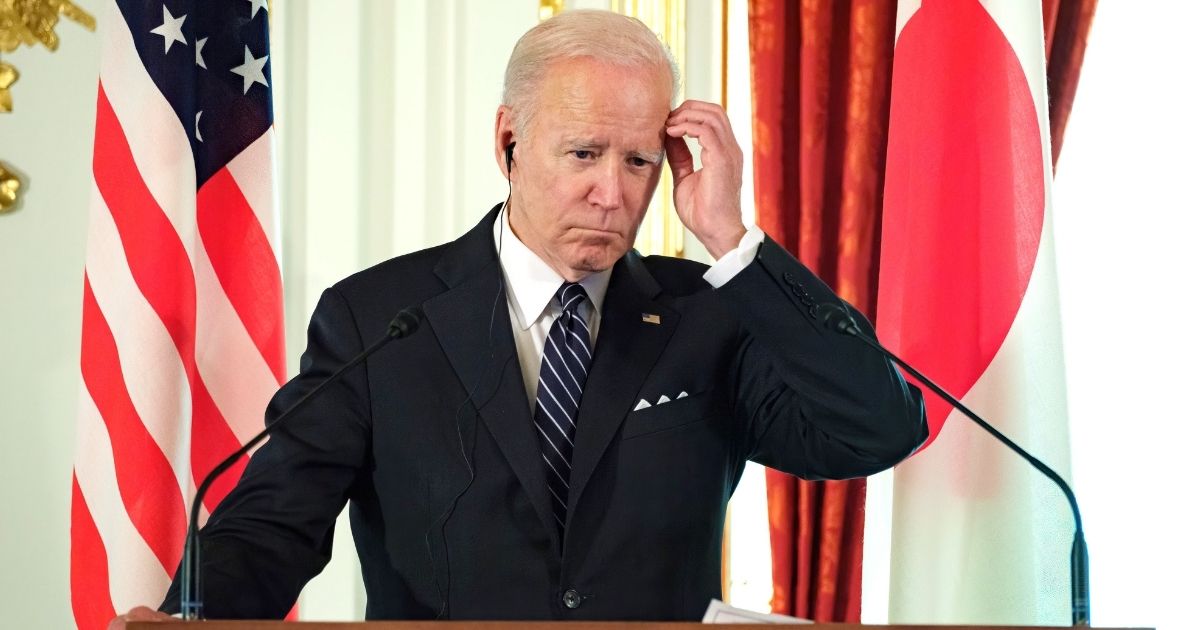
Nation's Emergency Heating Oil Stockpile May Be Drained as Biden Desperately Tries to Control Fuel Situation
President Joe Biden is mulling taking action to release federal diesel stockpiles in an attempt to curb the worsening supply shortage.
 www.westernjournal.com
www.westernjournal.com
Experts Issue a Warning as Biden Eyes Draining Nation's Emergency Heating Oil Stockpile
By Thomas Catenacci May 23, 2022 at 9:33am
President Joe Biden is mulling taking action to release federal diesel stockpiles in an attempt to curb the worsening supply shortage of the key fuel in New England, CNN reported Monday.
Biden recently asked officials to begin preparing a plan to order a release of fuel from the Northeast Home Heating Oil Reserve — a government stockpile of ultra-low sulfur diesel last tapped in 2012 during Hurricane Sandy — a senior administration official told CNN. The move reportedly reflected the president’s and White House officials’ concerns about surging diesel fuel prices and declining private sector inventories in the northeast.
“The system is definitely under strain,” the senior administration official told CNN.
“We think this looks like the exact circumstance where consideration of the release should be done, and that’s what the president has directed.”
The average price of diesel fuel — which is vital for transportation, construction and agriculture — skyrocketed to an all-time high of $5.58 a gallon on Wednesday, according to AAA data.
Diesel prices have been particularly high in New England where prices reached $6.43 a gallon last week, exceeded only by prices recorded in California.
Prices have surged largely due to declining East Coast diesel inventories, which dipped to 21.3 million barrels in early May — the lowest level ever recorded. The region consumes roughly 1.53 million barrels of ultra-low-sulfur diesel per day, meaning current inventory levels translate to about 13 days of supply.
The entire NEHHOR contains slightly more than a million barrels of ultra-low-sulfur diesel, or about 65 percent of East Coast daily demand.
“It’s small potatoes. It might buy a couple of weeks or even months, but it doesn’t solve the underlying issues,” Lipow Oil Associates President Andy Lipow told CNN. “It’s a band-aid — one that isn’t going to last very long, and when it comes off, the injury is not healing.”
Biden’s historic releases from the much larger Strategic Petroleum Reserve have had a minimal effect on oil and gasoline prices. Gasoline prices have hit multiple records highs, and oil prices have remained elevated in the aftermath of Biden’s 180 million barrel release from the reserves in late March.
The recent SPR releases have also led to a dwindling of national oil stockpiles. SPR stocks fell to about 538 million barrels on May 13, the lowest level since 1987, according to the latest government data.
The White House didn’t immediately respond to a request for comment from The Daily Caller News Foundation.
marsh
On TB every waking moment
I love your commentary Marsh. The rest of the country doesn’t give a shit about Commiefornia. They need to drop off into the sea. There are two many moving back to Oklahoma. More Texas plates here than Californians but Texans know no shame. They are super idiots. Y’all all need to go back home.
Dear Jaybird, Don't be so quick to judge. I am a Californian...

marsh
On TB every waking moment

Whatever Happens To The ‘Disinformation’ Board, The Feds Are Spying
Many disclosures show the federal government is indeed spying on Americans, and Congress still hasn’t done anything about it.
No Matter What Happens To Biden’s ‘Disinformation’ Board, The Feds Are Spying On Americans
BY: ADAM TURNER
MAY 23, 2022

IMAGE CREDITFOREIGN POLICY ASSOCIATION / YOUTUBE SCREENSHOT
A long line of suppressed disclosures has shown that the federal government is indeed spying on Americans, and Congress still hasn’t done anything about it.
Facing an increasing backlash against the Biden administration’s Disinformation Governing Board (DGB), Homeland Security Secretary Alejandro Mayorkas promised it would not monitor Americans. It was not enough. The U.S. Department of Homeland Security was forced to put the DGB on “pause,” and its director, Nina Jankowicz, resigned under public pressure.
Now DHS says it is “reviewing” the board while “continuing” its “critical work…to address disinformation.”
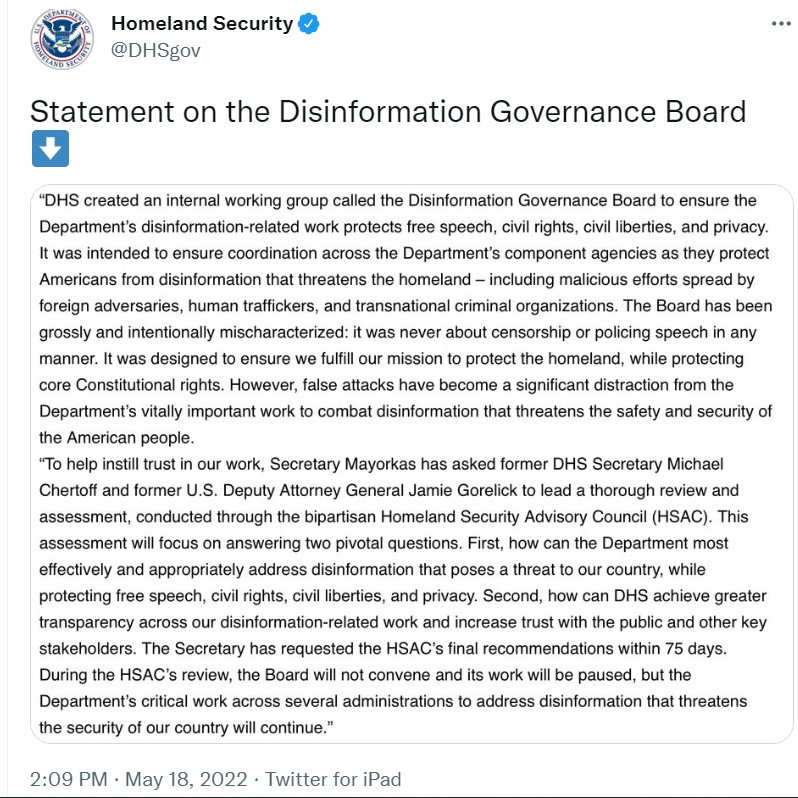
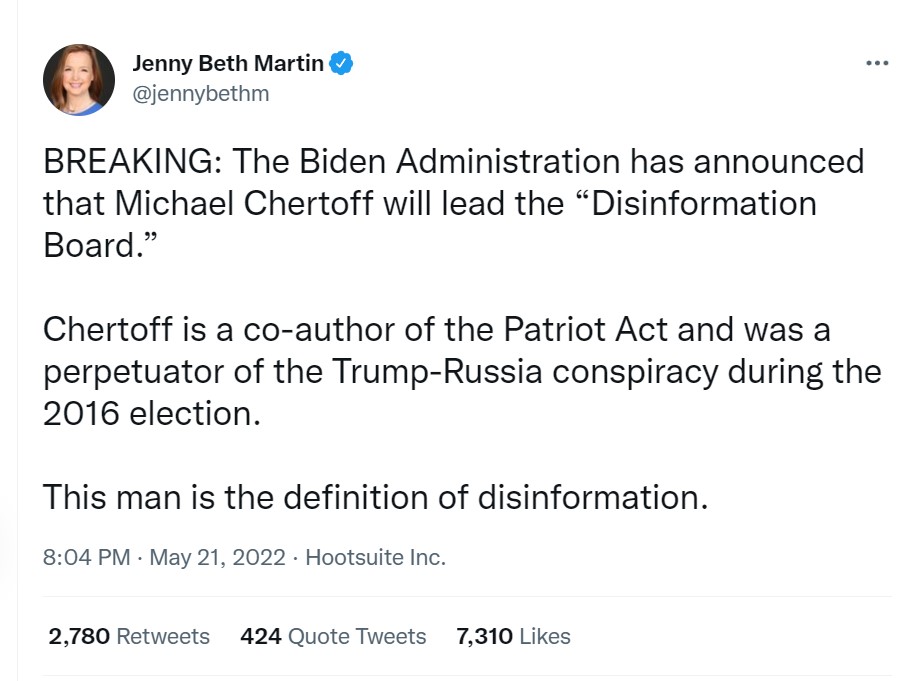
No matter what happens with the board, it is hard to take Mayorkas’s promise not to monitor Americans seriously. Several recent cases of the federal government spying on Americans as well as DHS’s own actions were certain to make people skeptical.
For example, in February of this year, DHS issued a National Terrorism Advisory System (NTAS) Bulletin, a memo prioritizing “false or misleading narratives” as a top domestic security threat. The bulletin states that “there is widespread online proliferation of false or misleading narratives regarding unsubstantiated widespread election fraud and COVID-19.”
This bulletin clearly referenced Americans inside our borders. Also, unlike with the DGB, DHS made no promise to not monitor Americans’ speech. (My organization, the Center to Advance Security in America, submitted several Freedom of Information Act requests for records regarding the NTAS bulletin and the DGB.)
Don’t forget Carter Page, either. Page was an advisor to the Donald Trump 2016 campaign. In 2016-17 the government investigated him on suspicion of being an intermediary between the Trump campaign and the Russian government. A later inspector general’s report identified “at least 17 significant errors or omissions” in the application for a warrant to surveil Page. A Department of Justice attorney was convicted of falsifying a document that led to a Page warrant.
Also recall the James Clapper spying scandal. Clapper, the director of national intelligence under President Obama, responded, “No, sir” and “not wittingly,” when asked at a Senate hearing if the National Security Agency was collecting “any type of data at all” on millions of Americans without a specific warrant. About three months after making that claim, documents leaked by former NSA contractor Edward Snowden revealed Clapper’s answer was untruthful, as the NSA was in fact collecting in bulk domestic call records, along with various internet communications.
There is also the CIA spying scandal. Sens. Ron Wyden of Oregon and Martin Heinrich of New Mexico, both members of the Senate Intelligence Committee who are privy to classified information, have warned about the existence of a secret bulk collection program that the CIA has operated “outside the statutory framework that Congress and the public believe govern this collection,” and without oversight by the courts or Congress.
The secret program appears related to bulk data swept up by the CIA in terrorism operations, including information on Americans, according to a heavily blacked-out report from a CIA oversight board that was declassified at the urging of the two senators.
Then there is Biden Attorney General Merrick Garland’s infamous school board memo. The memo directed the FBI to involve itself in local school board meetings under the auspices of anti-terrorism statutes due to supposed threats and violence directed against board members.
However, concerns that the FBI and DOJ were actually targeting the speech of parents were heightened, when, on October 14, 2021, another memo, released by the U.S. attorney in Montana, directed law enforcement to “contact the FBI” if a parent calls a member of a school board simply “with intent to annoy.” He claimed that “may serve as a basis for a prosecution” under federal law.
Garland and the Biden Department of Justice and FBI were forced to disavow the latter memo, since it appeared to directly target simple and non-threatening speech. During testimony, Garland assured Congress the memo would not be used to target parents for policy disagreements. Yet information recently obtained from FBI whistleblowers indicates the FBI had targeted and labeled dozens of investigations into parents with a threat tag, based on their associations and speech, including statements opposing mask and vaccine mandates.
As if to pour fuel on this fire, the woman DHS chose to lead the DGB was proven to be a proud and vocal proponent of censorship. Jankowicz has a history of attaching the “disinformation” label to speech she doesn’t like, regardless of its veracity.
With a record like this, would you trust Mayorkas’s promise that the DGB won’t monitor the speech of the American people? Neither would I.
marsh
On TB every waking moment
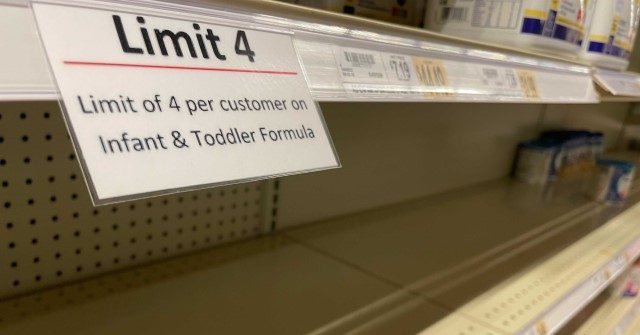
WATCH: Empty Shelves Nationwide as Biden Baby Formula Shortage Turns to Crisis
The Biden baby formula shortage continues to be visually noticeable as empty shelves have become common in grocery stores nationwide.
WATCH: Empty Shelves Nationwide as Biden Baby Formula Shortage Turns to Crisis
Breitbart News video on website 1:22 min
ETHAN LETKEMAN23 May 2022534
The Biden baby formula shortage continues to be visually noticeable as empty shelves have become a standard fixture in grocery stores nationwide.
In footage taken by Breitbart News and its readers, near-empty stores in states ranging from Oklahoma, Florida, Louisiana, New Jersey, Virginia, New Hampshire, and Missouri can be seen.
While infant hospitalizations due to this crisis continue to grow, no more than a few miles away across the Southern border, grocery stores in Mexico are well stocked, as documented by Breitbart News’s Cartel Chronicles team.
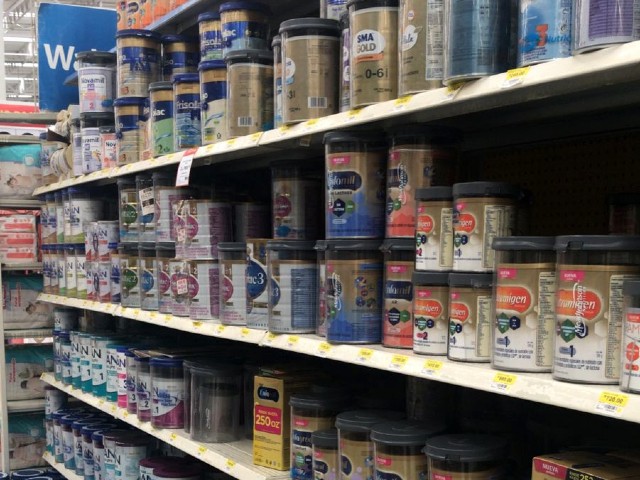
In the border city of Matamoros, Mexico – just south of Brownsville, Texas – a Walmart supermarket and also fully stocked. (Breitbart Texas/Cartel Chronicles)
Earlier this month, White House press secretary Karine Jean-Pierre said this issue was something the administration was aware of back in February.
“This is something [President Biden] is focusing on very acutely and again I said 24/7 we’ve been working on this since we have learned about this back in February,” Jean-Pierre said during a daily briefing.
Relief for American families may be several weeks away, however, despite Abbott Nutrition reaching an agreement with the Food and Drug Administration (FDA) on a plan to restart production at their Sturgis, Michigan plant. As News Channel 3 reports, “The plant could reopen in as soon as two weeks– but even once production starts, it could be another six to eight weeks before that product hits store shelves.”
Abbott issued a recall of their baby formula product in February after two infants reportedly died after consuming the product and another two became ill.
marsh
On TB every waking moment

NEW: The National Pulse Announces World Economic Forum Investigative Priority and Dedicated Site. - The National Pulse
PALM BEACH, Florida – The National Pulse is announcing a new investigative priority surrounding the work of the World Economic Forum, as well as launching a new public information website: TakeDownTheWEF.com.Founded in 1971 by German economist Klaus Schwab, the World Economic Forum (WEF) is an...
NEW: The National Pulse Announces World Economic Forum Investigative Priority and Dedicated Site.
IN ADDITION TO REGULAR EXPOSÉS, THE NATIONAL PULSE WILL ADD THE WORLD ECONOMIC FORUM TO ITS RESEARCH AND INVESTIGATIVE PRIORITIES.
ALM BEACH, Florida – The National Pulse is announcing a new investigative priority surrounding the work of the World Economic Forum, as well as launching a new public information website: TakeDownTheWEF.com.
Founded in 1971 by German economist Klaus Schwab, the World Economic Forum (WEF) is an unaccountable, non-governmental organization which convenes meetings of world leaders in Davos, Switzerland, with a view to impacting policy decisions on behalf of its members: predominantly multi-national corporations and politicians.
The group has been criticized for its stated aims of transforming or “resetting” global society for the benefit of private corporations rather than the public.
Schwab himself has argued governments are no longer “the overwhelmingly dominant actors on the world stage” and “the time has come for a new stakeholder paradigm of international governance.”
As a result, The National Pulse is announcing a new commitment to exposing the work of the World Economic Forum, and is calling on ordinary members of the public to help support this effort through our crowdfunding site: FundRealNews.com
Speaking on the subject, The National Pulse Editor-in-Chief Raheem Kassam said: “We’re not just setting up a resource for members of the public to learn more about the World Economic Forum, we’re also crowdsourcing information on the group. The World Economic Forum is the throbbing, blackened heart of globalism, and we intend to drive a stake in it. For those interested in taking the fight to this group journalistically, as well as politically, think about urgently supporting this initiative.”
The World Economic Forum’s Davos summit kicks off this week, with a massive number of attendees from the United States and Ukraine, as reported by The National Pulse last week.
REVEALED: The ‘Public Figures’ Attending the 2022 World Economic Forum in Davos.
Visit TakeDownTheWEF.com for more information on the World Economic Forum, and forward the domain to friends and family members
marsh
On TB every waking moment
Discover the Networks
An Online Database of the Left and its Agendas, a Guide to the Political Left
Tedros Adhanom Ghebreyesus
- Ethiopia’s former Minister of Health and Minister of Foreign Affairs
- Was elected Director-General of the World Health Organization in 2017
- Nominated Robert Mugabe, the Marxist former president of Zimbabwe, to serve as a WHO Goodwill Ambassador in 2017
- Purposely covered up three separate outbreaks of cholera in Ethiopia, so as to avoid the impact that a public admission of a cholera epidemic might have on tourism and on his party’s public image
- Was alleged to have helped facilitate a systematic genocide targeting the Amhara people of Ethiopia
- Was accused of complicity in the commission of “crimes against humanity”
- Served as a propagandist on behalf of Beijing in a massive coverup of China’s role in unleashing the deadly worldwide coronavirus pandemic in 2019-20
Tedros Adhanom Ghebreyesus was born on March 3, 1965 in the city of Asmara, which at that time was in Ethiopia but is now the capital of neighboring Eritrea. He earned a Bachelor of Science degree in Biology from the University of Asmara in 1986, a Master of Science degree in Immunology of Infectious Diseases from the University of London in 1992, and a PhD in Community Health from the University of Nottingham in 2000.
After graduating from college in 1986, Tedros joined the Ethiopian government’s Ministry of Health as a junior public health expert. Following the fall of Mengistu Haile Mariam, the tyrant who ruled Ethiopia from 1977-91, Tedros moved to London to attend graduate school. He then returned to Ethiopia and in 2001 was appointed head of the Tigray Regional Health Bureau. Two years later, he was named a State Minister of Health.
From 2005-12, Tedros served as Ethiopia’s Federal Minister of Health. During his tenure in that position, he purposely covered up three separate outbreaks of cholera (in 2006, 2009, and 2011) by simply renaming the deadly epidemics as “Acute Watery Diarrhea (AWD)” – even after the diagnosis of Vibrio Cholerae, the bacteria that causes cholera, had been confirmed.
According to the Amhara Professionals Union, a Washington-based organization that seeks to protect the political and economic rights of the Amhara people of northwest Ethiopia: “[Tedros’s] priority … was to conceal the impact a public admission of cholera epidemic might have on tourism and [the] image of his Party, rather than protecting the international community and attempting to reach out to the affected areas. Such a sad error due to lack of judgment resulted in a nationwide epidemic.”
Tedros received the Jimmy and Rosalynn Carter Humanitarian Award in recognition of his contributions to the field of public health in 2011.
From 2012-16, Tedros was Ethiopia’s Minister of Foreign Affairs. While holding that position, he greatly strengthened his own personal — as well as his nation’s — ties to Communist China.
Indeed, during Tedros’s years as Foreign Minister, China loaned more than $13 billion to his impoverished country — investments that were intended, in part, to make Ethiopia a strategic bridge for Beijing’s imperialist designs on the African continent.
In December 2014, Tedros and Chinese Foreign Minister Wang Yi wrote a joint op-ed in which they gave voice to the close bond that was developing between their respective countries. Below is an excerpt from that piece:
In 2017, Tedros ran for the post of Director-General of the World Health Organization (WHO), a specialized agency of the United Nations. But at that same time, a report appeared in the Ethiopian News & Views bulletin stating that he stood accused of complicity in the commission of “crimes against humanity.” That charge was related not only to the three aforementioned cholera coverups, but also to allegations surrounding Tedros’s longstanding political affiliation with the Tigray People’s Liberation Front (TPLF), an organization that: (a) grew out of the Marxist-Leninist League of Tigray (MLLT); (b) was responsible for horrific atrocities in Ethiopia — particularly targeting the Amhara ethnic group in the country’s northwest region; and (c) had become Ethiopia’s principal ruling party. In the 1990s, the U.S. government listed TPLF as a terrorist group. The Global Terror Database continues to list it as such, given the organization’s ongoing commission of armed attacks in rural areas. Meanwhile, the aforementioned Amhara Professionals Union has issued many accusations of systematic discrimination and human-rights abuses perpetrated by TPLF.“[O]n the basis of the principles of equality, mutual respect and win-win cooperation, China and Ethiopia have developed multi-dimensional relations, with people-to-people, business-to-business, government-to-government, and party-to-party relations as the cornerstones of the relationship. We are sincere friends, reliable partners, and good brothers … each rejoicing in the successes the other has achieved…. China has become the biggest foreign investor and the largest trading partner of Ethiopia.”
Tedros, for his part, is a high-ranking member of TPLF’s Central Committee, or politburo. The “crimes against humanity” allegations pertain, in part, to a systematic genocide that was carried out — at a time when Tedros was a leading figure in Ethiopia’s public-health infrastructure — against the Amhara, whom TPLF has identified as its “eternal enemy.” As the Amhara Professionals Union explains:
TPLF provided millions of dollars for Tedros’s campaign to become the leader of the WHO.“The candidate has treated his own citizens differently based on their ethnicity…. [Tedros], who descends from Tigre ethnic group, disfavored the ‘Amhara Regional State’ through poor health care. For instance, disproportionately high mortality coupled with selective application of contraceptives use has led to a selective reduction of the growth rate of the Amhara people. Such disparities were created and gaps increased across all measures of health in his leadership tenure. Of particular importance is the unexplained 2.5 million decrease in the Amhara population [between 1994 and 2007] under his healthcare leadership. The Amharas were victimized and punished due to their ethnic background.”
Those funds – along with vital support from China – propelled Tedros to victory when, at the Seventieth World Health Assembly in May 2017, the WHO Member States elected him to a five-year term as their Director-General, making him the first person to hold that position without a medical degree. Notably, the wife of Chinese President Xi Jinping was the WHO’s longtime goodwill ambassador – a post that enabled her to effectively promote Chinese interests under the penumbra of the UN.
(See more at website)
marsh
On TB every waking moment
Back to Davos and WEF
Averting a Global Food Crisis 45:34 min
Averting a Global Food Crisis
Speakers: Le Minh Khai, Julia Chatterley, Philip Isdor Mpango, David Beasley, J. Erik Fyrwald, Mariam Mohammed Saeed Al Mheiri
May 23, 202213:00 - 13:45CEST
The world may be facing the worst food crisis in decades, driven by the compounded effects of COVID-19, climate change and conflicts such as the war in Ukraine, exacerbating already skyrocketing food and energy prices and severe hunger.
What global priorities and business action are imperative to mitigate these global shocks and address the interrelated risks threatening food systems everywhere?
(The narrative: Food production systems are bad for the climate because of deforestation and cause 1/3 of global greenhouse emissions. We waste as much as 1/3 of what is produced. Inefficient farming, regional conflict, climate change and COVID-19 have caused food and fertilizer prices to climb. There are broken supply chains all over the world. Meanwhile, Russia has halted production on Ukraine's farms. The seeds that could allay this crisis are not allowed to be sown.
The consequence is that 49 million people are facing emergency levels of hunger. Over 800 million people are going hungry each night. Remember, China's food consumption is down because of lockdown. This could get worse very quickly. Alarm bells are ringing, but we need to act swiftly. Hungry societies break down...but there's hope.
Panel of experts who have plans that address the food crisis and climate change.
I will try and go back later and pick up the panelists' comments)
Averting a Global Food Crisis 45:34 min
Averting a Global Food Crisis
Speakers: Le Minh Khai, Julia Chatterley, Philip Isdor Mpango, David Beasley, J. Erik Fyrwald, Mariam Mohammed Saeed Al Mheiri
May 23, 202213:00 - 13:45CEST
The world may be facing the worst food crisis in decades, driven by the compounded effects of COVID-19, climate change and conflicts such as the war in Ukraine, exacerbating already skyrocketing food and energy prices and severe hunger.
What global priorities and business action are imperative to mitigate these global shocks and address the interrelated risks threatening food systems everywhere?
(The narrative: Food production systems are bad for the climate because of deforestation and cause 1/3 of global greenhouse emissions. We waste as much as 1/3 of what is produced. Inefficient farming, regional conflict, climate change and COVID-19 have caused food and fertilizer prices to climb. There are broken supply chains all over the world. Meanwhile, Russia has halted production on Ukraine's farms. The seeds that could allay this crisis are not allowed to be sown.
The consequence is that 49 million people are facing emergency levels of hunger. Over 800 million people are going hungry each night. Remember, China's food consumption is down because of lockdown. This could get worse very quickly. Alarm bells are ringing, but we need to act swiftly. Hungry societies break down...but there's hope.
Panel of experts who have plans that address the food crisis and climate change.

I will try and go back later and pick up the panelists' comments)
Last edited:
marsh
On TB every waking moment
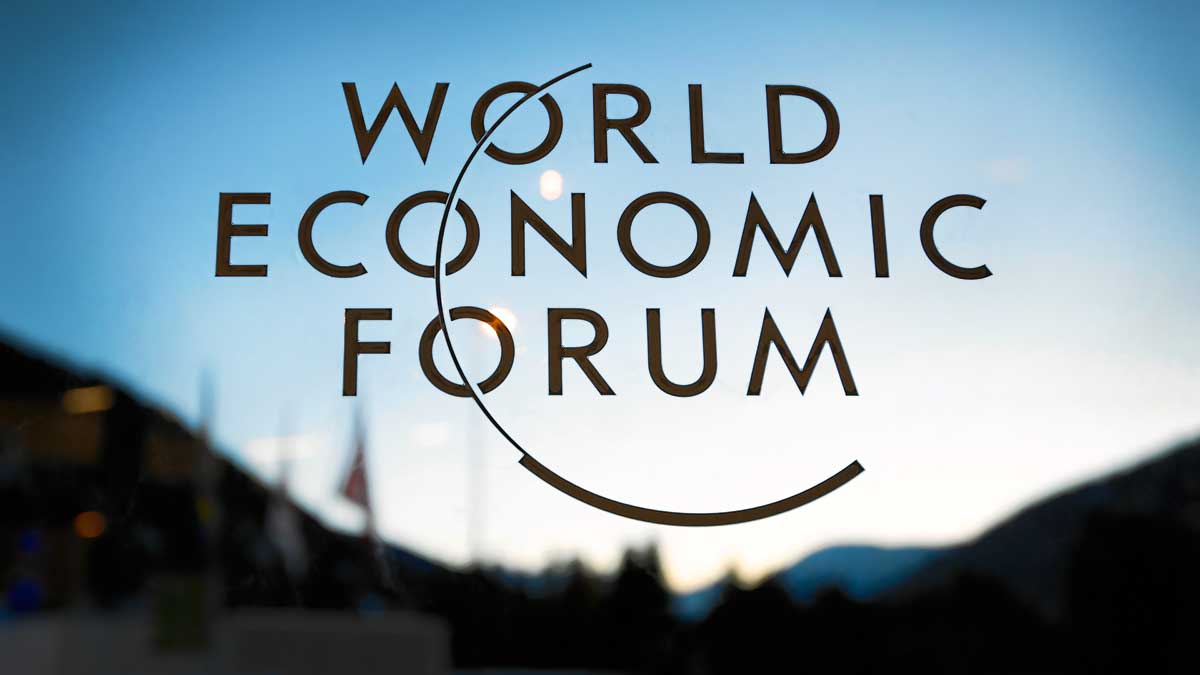
Fostering Effective Energy Transition 2022
Fostering Effective Energy Transition 2022 is the latest in the Energy Report Series from World Economic Forum in collaboration with Accenture. Read the complete digital report here.
Reports
Published: 11 May 2022
Fostering Effective Energy Transition 2022

Download PDF
This special edition report on global energy transition builds on the trends from the Energy Transition Index to provide perspective on the current challenges and recommendations on how to navigate the transition through a turbulent macroeconomic and geopolitical environment. A series of compounded shocks pose short-term risks to energy affordability, sustainability, and energy security. However, the window to prevent the worst consequences of climate change is closing fast, and the transition must be supercharged by ramping up clean energy investments, raising policy ambitions, and transforming consumer and industrial energy consumption. Strengthening energy security is paramount, dual diversification – in import partners in the short-term, and in fuel mix in the long-term – can improve resilience.
Download the full report to read more
marsh
On TB every waking moment
48:04 min
Global ESG for Global Resilience | Davos | #WEF22
May 24, 2022
World Economic Forum
With the pressures of climate change, public health, social inequality and now geopolitical stability and security on the mind of leaders around the world, the need for better transparency and comparability of environmental, social and governance factors is imperative. How can stakeholders continue to drive the global effort to provide capital markets with consistent, comparable and useful ESG information? This session was developed in partnership with CNBC-TV18. The World Economic Forum is the International Organization for Public-Private Cooperation. The Forum engages the foremost political, business, cultural and other leaders of society to shape global, regional and industry agendas. We believe that progress happens by bringing together people from all walks of life who have the drive and the influence to make positive change
marsh
On TB every waking moment
LIVE will start shortly
The Journey towards Racial Equity
Streamed live 84 minutes ago
World Economic Forum
At the height of the global Black Lives Matter movement, the anti-Asian attacks and the racial inequities exposed by the COVID-19 pandemic, many companies pledged to do better in their commitment to diversity, equity, and inclusion. What progress has been made on these promises two years later, and what more must be done to help businesses attain the goal of racial justice on the job and in society?
marsh
On TB every waking moment
LIVE
Safeguarding Our Planet and People (Climate change)
Started streaming 27 minutes ago
World Economic Forum
While food and energy supply chains are at risk, global carbon emissions rebounded in 2021 to reach their highest annual level and nature continues to decline rapidly, with 1 million species at risk of extinction. What bold innovations and actions are needed to build a more secure and resilient planet?
marsh, my head will explode if I read through every article. I swear, this country need to put bounties on sooo many heads, or maybe not 'this country', but some remaining patriotic elements... a hush hush go fund me, just saying.
it's now or later, and later will be too late.
it's now or later, and later will be too late.
Jaybird
Veteran Member
Not all Marsh but most that move here will vote for the same crap. Ask Texas how that will turn out. I know there are good people from California just like we have bad people here. No offense meant.Dear Jaybird, Don't be so quick to judge. I am a Californian...


